#or villains who have no tragedy except in what they sacrifice when they do make a turn around
Text
I think the weirdest fandom criticism I keep seeing is the insistence that distaste for certain redemption arcs is solely based on Christian based ideas of purity and suffering and like while a part of me gets this idea, I’m kind of like… the religion that focuses on and is literally famous for forgiveness?
You don’t think those defending often criticised redemption arcs, don’t have any potentially similar blind spots which can show in really ugly ways? That they are somehow immune from such influences?
Christian forgiveness, sometimes takes it too far and can push it to the detriment of victims in their communities and beyond. Especially when the abuser is more powerful in some way in their community. (And let’s be real: abusers by definition always have more power in some way, it’s when they get up the nose of someone with more power than them or those people give a shit /enough people group together against it that sparks can fly).
While I have experienced the anxiety from ‘all sins being equal’ and the resulting guilt: it also has very famously gone the other way and had people downplaying really horrific stuff. To dismiss those hurt. For after all: ‘we’re all sinners’.
Rather like in some of these botched redemption arc stories where the villain and hero almost always have to be bosom buddies: it can have communities make the victim have to interact with the one who hurt them instead of being allowed to at least peace out without losing everything they have ever known. That this will allow access to future and past victims because forgiving means forgetting to them. (Or at least pretending to). Because having a missing stair for new members or those unaware is apparently also fine?
But only being for punitive and worthless punishment can have Christian roots? The reverse extreme doesn’t have this issue? Nah mate.
Like maybe it’s more that almost any major religion or philosophy has its good sides or even ideas you can understand the root/benefit of: but almost nothing is above being exploited or abused by those in power.
There’s nothing immune from corruption.
Personal interpretations can go to bizarre lengths. Leaving interpretations up to others to do it for you has its own obvious issues. It’s life and it’s messy just in general. Even trying to find a middle ground between the two methods and discussion can be hard. And you are going to fuck up sometimes. There’s no easy trickty trick trick or perfect level you can keep to forever for perfect results every single time you have to make a decision. You can fail by refusing to make one too.
Christianity has major political and social powers itself in a wider society to the point it’s shaped it for centuries, even affecting non-believers internally in ways they don’t think about.
The perfect religion or philosophy does not exist. It never will. All you can do is the best you can and keep trying. And even then like I said: you’re going to fuck up.
A redemption arc isn’t always good or a good idea just because you projected onto/lusted after the character getting or not getting it. It isn’t always bad it happened because you can’t personally relate or like the character either.
#Fandom problems#idk I just find it really weird sometimes that people don’t realise this can go both ways#it is remarkably easy to exploit something with good intentions to your own ends#like the idea no one is perfect ?#correct and can be helpful#but people abuse the idea no end be it in who they think deserves punishment and who they insist should be forgiven#it’s not just one or the other#Like which characters get what and why?#like are you seriously telling me ky ren fans would go as hard if he wasn’t a particular demographic set?#things like that#To say nothing of the fact some re just not well written#Like bad faith takes exist#even with redemption arcs I personally hate#but the insistence that slavish devotion to redemption arcs can’t have its own twisted side is weird#If anything I wish we had redemption arcs where the hero and villain don’t become friends at all#and that’s fine#or sympathetic villains who don’t get redemption at all because that’s the choice they made#Tragic back stories don’t give you the right to become someone else’s when they weren’t responsible for yours#or villains who have no tragedy except in what they sacrifice when they do make a turn around#I’ll stop talking now
5 notes
·
View notes
Note
random question time! which wwx's relationship do you like the most and why? It could be platonic or romantic, all canons allowed
Thank you for the ask! Oh boy this question is hard, because I like I appreciate so many of his relationships for different reasons that picking just one feels kinda cruel
I think the biggest tie for me is between JC and LWJ for WWX.
Wangxian is the rare ship where I genuinely can only see them romantically with each other, like I’m multishipper, I’ll ship literally anything if you have an interesting concept, pretty words or beautiful art, like grab my attention I am yours, except these two, they live in my head rent free and they can only be together because like maybe you lost everything, maybe you can never go back to that blissful youth you once had, but that doesn’t mean you can’t build a new life for yourself and find happiness and all the grief and tragedy does not define you but you still want to help people and you will help people and maybe it isn’t the life you thought you wanted when you were fifteen but it is a wonderful one and you love and you are loved and you are happy and that is enough. Maybe you suffered, maybe you were cruel, maybe the world misread who you are and assigned you a role you did not ask for, but maybe that doesn’t matter because you know who you are, you are still kind, and you have someone who knows and understands you and trusts who you are. You are both also kind of insufferable in your love and get to be annoying too.
But JC & WWX are my ultimate tragic doomed platonic relationship, my neurotic little freaks who can’t be normal about each other and have zero boundaries, bickering idiots, wanting to go back to your youth except you’ll never be 15 again and you the person who knew the most intimate parts of yourself is now a stranger except you still see the glimmers of the person they used to be, the most brutal variation of you’ll never recover from that kind of devotion, the ultimate capturing lost youth and having to go down different paths and really depicting what growing up is like sometimes, the viciousness where I am able to hurt you unlike anyone else (regardless if I want to or not), the abusive household codependency of survival, literally carrying a piece of your soul in my chest and making the ultimate sacrifice you never asked for because I couldn’t bare to risk losing you, the hollowness is a symbol of my devotion and the fullness is an omen of our splintering, there is one brain cell being shared like a game of tennis, my pathetic meow meow and beloved blorbo, I genuinely can’t be normal about them.
I think if I really have to pick between them though, I’ll have to say JC & WWX just by virtue of I don’t like Wangxian fics that mischaracterize or villainize JC, like if he’s featured and isn’t a well-written character (Shanastorytellers' and loosingletters’ fics my absolute beloveds), it really takes me out of the narrative. His depiction and relationship with WWX has a lot of impact on my Wangxian enjoyment, and even in canon my beloved Wangxian gets to develop because of all the Ls this poor guy takes, so congrats JC, you win here! It’s by a literal hair, but JC & WWX platonic relationship, get these boys a reconciliation so they can drink in Lotus Pier and gossip about their kids and people they think are stupid, WWX it will enrich your marriage so much I promise. It’s what *I* deserve.
25 notes
·
View notes
Note
I kind of dig CQL Su's backstory for how unfair it was. Like, novel him you could see exactly why WWX and co were disgusted by him for his actions in almost handing over MianMian, but CQL him it's like... his friends were being slaughtered??? It just adds this sense of 'yeah king, kill the gentry' that matches Xue Yang more.
eh, for me the two narratives serve different purposes and I'm slightly fonder of the novel one. CQL SMS is good and very crunchy and also just. the sweetest boy and like you said, more overtly sympathetic; but:
Novel SMS sets up a more interesting 'character contradiction' in that he starts as a teenager who does something genuinely bad and cowardly (we know it, everyone knows it, he knows it) who can't quite match the local golden boy in skill... and then he grows up to be a sect leader, a brilliant powerhouse of a fighter, and a brave-to-the-point-of-self-sacrifice, loyal man. And he does it for the villain because the 'good' people treat him like crap. And he does it, crucially, offscreen.
No matter how he grows and changes, he's treated like a failed disciple for the Lan, a failed copy of LWJ. No other reason is given than 'he gets mad at being compared to LWJ and plays the guqin, the most common spiritual instrument.' He's not despised by WWX for being a coward in the past--WWX is pissed off in the moment, and then true to form forgets about it. He mocks SMS for daring to criticize the Lan while having once come from them, and later--when he remembers seeing SMS in the past--he's only concerned with why did you ruin my life, what did I do to you? And SMS' response is, basically, why do you think you're the main character?
SMS considers himself the center of the story when it's not about him. Watsonianly, it takes the form of people finding him arrogant and his anger unjustified; doylistically, it's fascinating to realize that he has a dramatic character arc that we never see, and interesting to read his baffled rage at LWJ--what reason does he have to act arrogant and get away with it? why is fate on his side and not mine? as an almost fourth-wall aware complaint. Why isn't SMS a main character? He just isn't. It's not his story. He was created for a certain role and he wants a different one, but it's impossible inside this framework. It's a frustration at the center of his character that plays in a fun way with other themes of the story (is it only perspective that makes a hero or a villain? etc).
And it's totally understandable that CQL sort of... shifts that an inch sideways and it becomes class-specific rage. What is class jumping but wanting a role you weren't given? The change of his Cowardice Event to something more sympathetic also makes sense in this context, and it's placement nearly side by side with Meng Yao's murder of the captain does drive in his increased similarity to his later villainous friends. I like CQL, genuinely. It feels like a less meta story to me, but that doesn't make it worse--just more self-contained, a little bit different overall.
But the novel's version of events is honestly more about audience perception than the involved characters, imo. People don't despise him later for what he did then, except (possibly; we see no indication but he could be thinking it) LWJ. It's on the audience to still only see him as the cowardly kid who nearly handed over Mianmian, just as the Lan see him as a failed disciple and others see him as arrogant beyond his station. Then Guanyin Temple displays so much that was concealed about everyone, and you find out SMS has been hiding his accomplishments and abilities for years, is not too proud to loyally serve the son of a prostitute, and is willing to die without hesitation.
What a character, what an arc. In a different life (story), he could have been great (the main character).
Not in this life, though.
and that's my extremely too many words overanalyzing essay on why novel!sms is my fave by a slim margin. it's about the tragedy of the meta implications that feel like they aren't really there in the more sympathetic/contained CQL version 👌
#su she#su minshan#sorry you unlocked my SMS emotions again so i just wrote FAR too many words#also i feel like my lens on mdzs is so shaped by reading Scum Villain before i read it#so keep that in mind
222 notes
·
View notes
Note
A twst and NeverAfter crossover! A Twisted Neverland! There are so many possibilities!
Warning: NeverAfter/twst chapter 7 spoilers
I imagine the RSA princes’ motives might be a combination of the Fairies and the Princesses; something like, destroying twisted wonderland in order to return to the “true” version of the story. Because imagine how unfair it must feel to go from being the most important character in your story to barely even getting a name. I could see that leading to a mindset of setting right what once went wrong, only their definition of “right” is a bit myopic. Nevemind that their plan would doom all of the NRC students because “they’re villains, villains don’t deserve happy endings”
I know he’s taking the role of the Stepmother but Malleus’ goal also gives him a lot in common with the Baron of Bricks. A beginning with no ending. And a conflict with death (which is perfect since Idia, twisted from the ruler of the underworld, is gonna go up against him in canon). Perhaps that’s why he’s not too far gone to save? Because he doesn’t want to completely destroy everything, instead he wants to preserve certain parts of the story at the expense of everything else. Or is he at a point of “if I can’t have you no one can”?
What’s Lilia’s role in this? I can’t imagine he’d willingly go along with this insane plan if he understood what was going on, considering his reaction at the party. So is he being controlled? I guess that would mean Silver is in a similar position to Pinocchio.
If the students are sticking to the script doesn’t that mean that Yuu has to meet with Malleus? Not very often (thank god) but I doubt he’d take kindly to being denied their friendship, not after everything he’s sacrificed to keep it. Man, imagine meeting this eldritch creature and being expected to act all clueless and call him Hornton like you’re not painfully aware that he wants to eat you or something.
And are all the students aware of the nature of their world? Was it harder for some of them to awaken than others? Specifically the ones without an obvious analog from the other stories? Like Jack, or those twisted from plot devices instead of characters? (Epel: I’m a goddamned apple)
Sorry for the long disjointed rant, your au just combined my two current hyperfixations:D
Thank you for the ask, dear anon!
These are literally my two hyperfixations right now, I am vibrating in place—
(Also this is just one of the two possible crossovers I’ve had in mind. After all, if Disney interpretations of fairy tales exist within Neverafter, who’s to say our intrepid heroes couldn’t wash up on Sage Island one fine morning?)
And yes that is what’s happening with the RSA princes—much like the Neverafter princesses they have basically decided that the villainous world of Twisted Wonderland is only making people residing in it unhappy as things get worse and worse every run. Therefore the only way to save everyone and make them happy is by making sure this backwards, twisted world no longer exists.
Yes, Malleus’ goals are basically an amalgamation of the two—like when the stepmother started out and the Baron, all he wants is a way to keep Lilia from getting sick and to keep his human in Twisted Wonderland without needing to ever worry about parting. Except, then he discovered that his story was written to be a tragedy where he confronts loss and learns to move on despite it. And in his current mindset, the being formerly known as Malleus Draconia was not prepared to accept that this narrative would only take from him that which he held dear.
Isn’t it better that he sacrifice the very thing binding him to this tale, the name of the heir to the Valley of Thorns, if it means he can surpass the Thorn Fairy and destroy all that which is unnecessary to his happiness? Even if his current power is insufficient to do so, all he needs to do are consume the other manifestations of “Dorm Head” or “Villain” until he is the only being left with any claim to these titles, no?
He’s not quite at the point of “if I can’t have you, no one can” but he is getting there. Oh boy is he getting there.
Lilia, Crowley and by extension Sebek are trying to work against the Diasomnia Dorm Head to get things Back on Track (or what they think Back On Track is). As fae, they’re a bit more aware of the ways in which the narrative should run, and the beings whose attentions they do not wish to attract for fear of them making the story worse.
For Lilia and Sebek this is hard as they need to try and keep Diasomnia running like how it was when the Dorm Head was still mostly person shaped, while ensuring no one deviates from the script by force, if they must. They can’t do much about the Dorm Head, as he’s basically drifting around doing whatever he wants to try and gain more power, but for the more human students? Well, it’s not like these individual, self-centered mages can really fight back against Crowley or Lilia’s capabilities, right? Just stick to the plan and everything will be fine, they promise.
Of course, this is without the additional factor that every parallel version of Twisted Wonderland our heroes end up in after they die incorporates more of the darker and grittier aspects of the original tales than the ones before it.
Kalim al-Asim hasn’t had the freedom to think for himself since the start of the year, for example. Crossing the Octavinelle trio is a sure fire way to find yourself vanished without a trace, the dorm students of Ignihyde seem to be halfway to the underworld already, and some say the dorm head of Heartslaybul will paint the roses red with the blood of those who fail to live up to his exacting standards.
Yuu, Grim, Silver, Rook and Ortho are all part of Team “maybe we shouldn’t have to follow our stories to the letter to find happiness but we don’t want the world destroyed either thnx”.
Grim, quite understandably, does not want his story to end with him turning into a monster that either kills his friends or gets killed by them, and so is trying to find a way to avoid this fate.
Silver and Rook, thanks to their more light-aligned origins, are similar to the RSA students in that once they’ve “awoken” they’ll stay that way across every version of themselves. Silver is taking it much harder than Rook is, though it’s not easy for him either.
Ortho, thanks to Idia modifying his memory databanks so they can be transferred across dimensions, is able to pretty much “awaken” whenever an alternate version of him is destroyed.
Yuu’s notebook, which they originally used in their Villainous Paranoiac ‘verse to record everything that happened to them and try to figure out a way to prevent overblots, functions very much like Timothy Goose’s storybook, if more…prone to overwriting its wielder with the memories stored within.
Most of the students who “wake up” usually join this side as well. It’s actually much easier for the students who aren’t twisted from defined character within their story to “awaken”. After all, it’s much harder for a person to be twisted into a worse version of their story counterpart if that counterpart is say, an apple, a pair of cards, or a wolf that never appeared in the first place.
Thank you for ranting though! I really enjoy reading through things like this!!
#twisted wonderland#twst#neverafter#twst spoilers#neverafter spoilers#twisted wonderland yuu#twst yuu#villainous paranoiac yuu#malleus draconia#twst rsa#twst silver#twst grim#rook hunt#ortho shroud#lilia vanrouge#sebek zigvolt#dire crowley
53 notes
·
View notes
Text
I actually lost sleep over merlin last night and i still have a lot of thoughts
i never actually watched the show after the first time through when i was 14. And the impressions i was left with this entire time was: merlin is gay; arthur and gwen are SO cute but i still think merthur is even stronger; morgana's downfall makes me depressed because once they were all friends and then she betrays them all; poor merlin trying his hardest to make the parts of destiny he likes happen and the parts he doesnt like NOT happen, he is literally a tragic hero and for all his efforts, for all his sacrifice and the time he spent closeted, arthur still dies and the ending made me sob for a week
But now that i'm rewatching i feel like i remembered it completely wrong and i feel like a lot of people do too. Yes the ending is tragic and it hits as hard as it did because we've always knownit was going to end like this, they've been telling us since season 1!!
But its also tragic because..merlin is such a damn bootlicker. Its tragic to see him stop fighting for his rights and even stop WANTING to stand up for himself. All he cares about is arthur arthur arthur, and i dont just mean this like he's obsessed in a bad way because he loves kissing the monarchy's ass. ITS BECAUSE MERLIN IS 100% ACTUALLY GENUINELY IN LOVE WITH ARTHUR! And arthur loves him a lot too, just not romantically. ANDTHESE TWO ASPECTS ONLY MAKE MERLIN'S SITUATION ALL THE MORE TRAGIC AND PATHETIC.
For some reason I remembered this show as being so sad because For The Power Of Good, merlin had to sacrifice living openly. When really this show is so sad because Merlin willingly submits and renounces his rights, his fire, his rightful desire for respect for himself and his kind all because he is in love with a man who, if he knew the real him, would have him exiled or even executed
And you know what? There's elements of that same Tragedy Of Bootlicking in gwen and gaius as well. Both have been wrongfully accused and nearly executed by uther (gwen's father was ACTUALLY executed by him) and yet they continue to not only not seek revenge (which fair enought, thats your choice) but they continue to serve under him DIRECTLY at his fucking palace. ?!?!? Logic?!?! Logic where did you go?!?
Gaius has been criticized in the show by other sorcerers for betraying their kind for standing by as they were slaughtered and now working directly for uther. Why?!? Why did gaius do this?!? Honestly, i have to believe it was just fear and cowardice and convenience. His other choice was exile or maybe death and he chose submission. MUCH LIKE MERLIN!!
What about gwen? Why does she stay in camelot after her father is murdered? How can she possibly bear it? Because she is in love with a man who she believes will bring about a new era of prosperity and peace and rights (for servants and the lower class in general). MUCH LIKE MERLIN!! (Except he also wants rights for those with magic)
Morgana is the only bitch i respect around here. She is the only one who says "you know what? Fuck this and fuck you, i will not submit just because i have blind faith in the hope that one day things might be a bit different". Oooo and she is the villain of this tale, i see... just because she refuses to bootlick...
#merlin#you know this show is really compelling because im somehow rooting for all the main four even though they're at odds with each other#and are all terrible in one way or another#particularly rooting for morgana though who am i kidding#but im shaking merlin and gwen like AMIGA DATE CUENTA!!#especially merlin#bc at least gwen does become queen. her efforts and patience do sort of pay off#but merin?? he reaps no reward#as for arthur im like..oh. hey. (greets cordially because you're my friend's boyfriend whom im sorta iffy about)#although he doeshave a really big heartand he does love gwen and merlin#and his storyline with gwen is so cute. im not gonna lie#long post#bbc merlin#merlin rewatch
17 notes
·
View notes
Note
I was rereading your overwatch 2 speculation post when I saw that you said you can write a whole post about Widowmaker’s redemption through death. I would like to see this post please, for you and I have very different ideas about her redemption.
Thanks for the ask!
First off, just because I think it'll happen doesn't mean I agree with it.
To put my thoughts very, very simply: Widowmaker has done too much on-screen bad to ever be redeemed the proper way by Blizzard. There's a concept in storytelling called "character karma" which describes how to keep an audience satisfied by how characters act. It's a very basic concept: characters who do good things get rewarded, and characters who do bad things get punished. Generally, most stories that aren't explicit tragedies ensure that a character's karma gets appropriately balanced by the end of the story.
(There's a whole list of possible exceptions to this rule, of course, but please do consider: when was the last time you saw a villain win? Even if they win in the short term, they usually don't in the long term. Also keep in mind that Overwatch as a narrative (as its tone has been established so far) is not a tragedy. There are tragic characters, of course, but the overall story does not have a downward spiral. We as the audience know that Talon will be stopped at the end of Overwatch 2. I expect that I do not need to elaborate as to why, because we'd be here all week and I'd have to bring up the MCU.)
Okay, now back to Widowmaker- why do I think she won't get a redemption? Because she is Overwatch's most despicable villain. Hear me out.
She's Overwatch's most despicable because no other character in this franchise has killed an innocent person on-screen. By "on-screen", I mean depicted in a visual format- animated shorts and custscenes taking priority, then comics, then current-timeline short stories. And when we look at canon, on-screen killings, we actually have very few: we have Mondatta, and we have the mob boss that Reyes killed in Retribution. On-screen killings score the highest on the "bad guy" karma scale because they're tangible and immediate. They represent a character's current actions and they're things that directly impact the audience, too, who is invested in this current world and characters. Actions in the backstory and lore don't have the same punch for this reason.
The next step down on the "bad guy" karma scale is backstory/lore killing and torture, though- Doomfist, arguably the main villain of Overwatch, is hanging out right here with an unspecified number of murders at Numbani Airport, but the fact that the audience isn't shown it lessens the oomph. Hanzo would be here if Genji stayed dead, but given that he's not it significantly lessens the "bad guy"-ness of it. Similarly, I'd place Moira here, too, because we know she did the fucked up things to Reaper, Widowmaker, and (partially) Sigma, but we're only briefly shown Reaper's torture in her introduction short and that's it.
Given how much of a narrative and moral focus was put on Mondatta's assassination. . . I just don't think it's something that Widowmaker will be able to get away with. "Redemption" in storytelling is inherently a reward, and Widowmaker just doesn't have the character karma to justify that kind of reward, and I doubt Overwatch 2 will dedicate the screentime to it. Even though we as the audience know that she's a victim, Overwatch's narrative so far isn't painting her as someone who can be saved, not after she's crossed that moral event horizon.
However, however, however, it does leave one option- redemption by death. Redemption by death is a classic one because a heroic sacrifice does wonders to balance out character karma. It's quick, it's easy, it's free, acknowledging her tragic backstory while also making it so that they don't have to put the work in and ask the hard questions of "how would this character make up for what they've done?"
TL;DR: Because Storytelling Reasons, Blizzard isn't gonna spend the time to try and properly redeem her and will instead have her die for her sins.
#overwatch#overwatch 2#widowmaker#this is kind of a bummer post I apologize#I'm definitely not anti-redemption for Widow#I think it would be fascinating to see how she'd recover#but consider that overwatch has 35+ characters and will not have enough screentime to focus on any of them for very long#widow can't get the time she needs#whereas Sigma is being broadly and blatantly advertised to be innocent and redeemable at every turn#do with that what you will#thanks for the ask!
30 notes
·
View notes
Text
Being A Hero Isn't Worth It; A Deeper Look At Wanda's Life
think back to the first time we meet Wanda. in Age of Ultron she is unabashedly allied to Hydra and has no qualms about going up against the Avengers. in fact, she's eager to do it. by this time, her life has been marred by tragedy.
by the end of the film, hydra is (mostly) gone and Wanda has seen the truth behind Ultron's plans. seeing the error of her ways, she joins up with the Avengers and helps to defeat the murderbot and save innocents.
as a reward for her growth and heroic deeds, her brother is killed.
skip forward to her next appearance. Wanda is pushing through her grief and loneliness and is trying her best to be one of earth's mightiest heroes. she is working to harness her powers to best help others. on a mission, she attempts to save those closest to her. in doing so, she accidentally blows up a building which results in the deaths of innocents.
Wanda is widely seen as a monster, sent to prison in a straitjacket, and could easily be argued to be the catalyst in the breaking up of the Avengers.
by the time of Infinity War, it seems things might be looking up for Wanda! yeah, sure. she's on the run. but for the first time since her brother died, she's finally found someone who makes her feel comfortable and cared for.
Wanda is forced to sacrifice her one happiness in life to ensure the safety of the universe.
that sacrifice turns out to be in vain.
when Wanda is Snapped, she is relieved.
upon her return, Vision is given no funeral. she doesn't know where he's ended up. she goes to find him. she says goodbye. she goes to mourn the life she knows she can never have. except really... she can have it.
it's all a fallacy and eventually she realizes that. people are in pain because of her. that wasn't what she wanted. she gives up her family. once again, she is seen as a monster.
then, she has the darkhold whispering in her ear. corrupting her very soul. she is broken and grieving and bitter. for the first time, she's beginning to see what she can really do with her power. the darkhold reveals her destiny.
but she doesn't want to rule the multiverse. all she wants is a family.
whenever Wanda has tried to be a hero, she's been hurt for it. she has had to sacrifice everything dear to her time and time again. following that logic, to get what she wants, people are going to have to get hurt. through the lens of the darkhold, it's a small price to pay.
so, no. I don't think Wanda becoming a villain is out of character or came out of nowhere. she has more of a reason to than anyone else in this universe.
tl;dr whenever Wanda has tried to be a hero she's gotten hurt for it. that coupled with the corruption of the darkhold leads to very solid villain reasoning
#do i think it could've been fleshed out more? obviously#the jump been wv and mom in particular is pretty steep#but when looking at the entire picture it makes a ton of sense to me#wanda maximoff#the scarlet witch#scarlet witch#marvel#mcu#wandavision#multiverse of madness#doctor strange in the multiverse of madness#age of ultron#madeinwundagore#ramblingsfromwundagore
7 notes
·
View notes
Text
scum villain is a greek tragedy disguised as a regular tragedy disguised as a comedy disguised as a danmei
this is going to be long, and this is only PART ONE.
a.k.a, Analysing the plot of Scum Villain’s Self Saving System through Aristotle’s Poetics, because I Have Mental Issues
Part One: Introduction and the Tragic Hero
Scum Villain’s Self Saving System is a tragedy disguised as a comedy, unless you’re Shen Yuan, in which case it’s a mixture of a romance and a survival horror. It's a fever dream. It's a horrible, terrible book that made me feel new undiscovered emotions when I finished reading it.
The thing is... SVSSS shares characteristics with some of the most famous tragedies in the West, such as Oedipus Rex, Medea, Antigone, the Oresteia... if you haven’t read these, I’ll explain everything. But the gist of my argument is this: SVSSS is the perfect tragedy. In triplicate.
Tragedy as a genre is old as balls and so it has meant slightly different things to different people over the last few thousand years. I'll be focusing on ancient Greek tragedy, which was performed at the yearly Festival of Dionysus in Athens during the 500-350s BC (give or take a hundred years). Aristotle, when writing about this very specific subset of tragedy, had no idea that one day Scum Villain would be written, and then that I would be using his work as a way to look at Shen Qingqiu’s Funky Transmigration Mistake. Anyway!
Greek tragedy greatly influenced European dramatic tradition. I have a lot of opinions about white academics idolising and upholding the classics as the "paragon of culture" but I'll withhold them for now. I have no idea if MXTX has read Greek tragedy or not, so don't take this as me saying they are writing it.
In my opinion, tragedy is a universal human constant. We are surrounded by pain and hurt and none of it makes any sense, so we seek to process that pain through drama, art, literature, etc. We want to understand why pain happens, and how it happens, and try to make sense of the senseless. The universe is cold and cruel and random. Tragedy eases some of that pain.
On that note: Just because I am analysing Scum Villain through a Greek lens doesn't mean that it was written that way. I'm pasting an interpretation onto the book when there's probably a very rich and deep history of Chinese tragedy that I just don't know about. If you ever want to talk about that, please, god, hit me up, I would love to learn about it!!
Anyway, tragedy. MXTX is excellent at it! Mo Dao Zu Shi? Painful dynastic family tragedy. Heaven Official's Blessing? Mostly romance, but she managed to get that pure pain in there, huh?
But in my opinion, Scum Villain holds the crown for the most tragic of her stories. MDZS was more of a mystery. TGCF was more of a romance. Neither of them shy away from their tragic elements.
Scum Villain would fit right in between the work of Sophocles, Euripides and Aeschylus. How? Let me show you. Join me on my mystery tour into the world of "Aristotle Analyses Danmei..."
Part One: The Tragic Hero
What is a tragic hero? Generally, Greek tragic heroes are united by the same key characteristics. He must be imperfect, having a "fatal flaw" of some kind. He must have something to lose. And he must go from fortune to misfortune thanks to that fatal flaw.
There are two (technically three) tragic protagonists in SVSSS and all of them are tragic in different but formulaic ways. Each protagonist has their own version of “hamartia” or a “fatal flaw”.
Actually, hamartia isn’t necessarily a flaw - rather, it is a thing which makes the audience pity and fear for them, a careful imperfection, a point of weakness in the character’s morality or reasoning that allows for bad things to happen to them. For example, in Oedipus Rex, the king Oedipus has a “fatal flaw” of always wanting to find the truth, but this isn’t exactly a flaw, right? Note: this flaw can be completely unwitting, as we see with Shen Yuan. It can also be something that the protagonist is born with, some kind of trait from birth or very young.
Shen Yuan
Shen Yuan’s “hamartia” is his rigid adherence to fate and his inability to read a situation as anything but how he thinks it ought to be. He believes that Bingmei will grow into Bingge, and it takes several years, two deaths, and some truly traumatising sex to convince him otherwise.
Shen Jiu
Shen Jiu’s fatal flaw is his cruelty. It is his own sadistic treatment and abuse of Binghe which directly leads to his eventual dismemberment. This is kind of a no-brainer. Of course, it isn't all that simple, and as an audience we pity him for his cruelty as much as we fear it because we know it comes from his own abuse as a child. This just makes him even more tragic. Delicious.
Luo Binghe
Luo Binghe’s fatal flaw is a complicated mix of things. It is his position as the “protagonist” which compels him to act in certain ways and be forced to suffer. It is his half-demonic heritage, something entirely out of his control, which sets in motion his tragic reversal of fortune when he gets yeeted into the Abyss. He also, much like Shen Yuan, has the propensity to jump to conclusions and somehow make 2 + 2 = 5.
As well as having their respective “flaws”, all three protagonists match the rough outline of a good tragic hero in another way: they are in a position of great wealth and power. Even when you split the different characters into different “versions”, this still holds true. Yes, Luo Binghe is raised a commoner by a washerwoman foster mother, but his dad is an emperor and he also ends up becoming an emperor himself.
Yes, Shen Jiu is an ex-slave and a victim of abuse himself, but Shen Qingqiu is a powerful peak lord with an entire mountain’s worth of resources at his back.
Shen Yuan is a second generation new money rich kid.
Bingge is a stereotypical protagonist with a golden finger. Bingmei is a treasured and loved disciple with a good reputation and a privileged seat by his shizun’s side.
In a tragedy, having this kind of good fortune at the beginning of your story is dangerous. Chaucer says that tragedy is (badly translated into modern english) “a certain story / of him that stood in great prosperity / and falls out of high degree / into misery, and ends up wretchedly”. If we follow this line of thinking, a good tragedy is about someone who has a lot to lose, losing everything because of one fatal point of weakness that they fail to address or understand.
If we look at Shakespeare, this is what makes King Lear such a fantastic tragic protagonist. He is a king in control of most of England, who from his own lack of wisdom and excess of pride, decides to split his kingdom apart to give to his daughters, favouring his murderous, double crossing progeny, and condemning his only actually filial daughter to death. He loses his kingdom, his mind, and his beloved daughter, all because of his own stupidity.
This brings us to:
Part Two: Peripeteia
This reversal of fortunes is called peripeteia. It is the moment where the entire plot shifts, and the hero’s fortunes go from good to bad. Think of it like one of those magic eye puzzles, where you stare at the image until a 3D shark appears, except you realise the shark was always there, you just couldn't ever see it, waiting for you, hungry, deadly, always lurking just behind that delightful pattern of random blue squiggles.
Each tragic hero has their own moment of peripeteia in SVSSS, sometimes several:
Shen Qingqiu
In the original PIDW, SQQ’s peripeteia presumably occurs when he finds out that Bingge didn’t perish in the Abyss but has actually been training hard to come and pay him back. There’s really not much I’m interested in saying here - as a villain, OG!SQQ is cut and dry, and the audience doesn’t really feel any pity or fear for him. As Shen Yuan often mentions, what the audience feels when they see OG!SQQ is bloodlust and sick satisfaction. There is also the trial at Huan Hua Palace, which I will talk about in Shen Yuan’s section.
Shen Yuan (SQQ 2.0)
One of SY’s most poggers moment of peripeteia is the glorious, terrifying section between hearing Binghe for the first time after the Abyss moment, and getting shoved into the Water Prison.
“Behind him, a low and soft voice came: “Shizun?”
Shen Qingqiu’s neck felt stiff as he slowly turned his head. Luo Binghe’s face was the most frightening thing he had ever seen.
The scariest thing about it was that the expression on his face was not cold at all. His smile wasn’t sharp like a knife. Rather, it showed a kind of bone-deep gentleness and amiability.”
This is the moment of true horror for Shen Yuan, because he knows what happens next: the plot unfurls before him, inevitable and painful, and he knows that death awaits him at Luo Binghe's hands (lol). Compare it with the bone deep certainty with which he faces his own downfall during the sham of a trial later in the chapter (I’ve bolded the important part):
“In the original work, Qiu Haitang’s appearance signified only one thing: Shen Qingqiu’s complete fall from grace. [...] Shen Qingqiu’s heart streamed with tears. Great Master… I know you’re doing this for my own good, but I’ll actually suffer if she speaks her words clearly. This truly is the saying “not frightened of doing a shameful deed, just afraid the ghost (consequences) will come knocking”!”
After the peripeteia is usually the denouement where the plot wraps up and the threads are all tied together leaving no loose ends, but because this tragedy isn’t Shen Yuan’s but the former Shen Jiu’s, it’s impossible to finish.
Shen Yuan cannot provide the meaningful answers that the narrative demands because 1) he doesn’t have any memory of doing anything, and 2) he wasn’t the person who did them. Narratively, he cannot follow the same path as the former SQQ because he lacks the same fatal flaw: cruelty.
This is why Binghe doesn’t kill him - because he loves him, rather than despises him. And this is why Shen Yuan has to sacrifice himself and die for Luo Binghe in order to save him from Xin Mo: because the narrative demands that denouement follows peripeteia, and SQQ’s fate is in the hands of the narrative.
(Side note: I believe that this literal death also represents the death of OG!SQQ's tragic arc. The body that committed all those crimes must die to satisfy the narrative. SQQ must die, like burning down a forest, so that new growth can sprout from the ashes. After this, Shen Yuan's story has more room to develop instead.)
It must happen to show Bingmei that SQQ loves him too. And this brings us to Bingmei.
Bingmei
Bingmei has two succinct moments of utter downfall. The first is a literal fall - his flaw, his demonic heritage, leads his beloved shizun to throw him down into the Abyss. From his point of view, SQQ is punishing him simply for the status of his birth. He rapidly goes from being loved and cherished unconditionally, to being the victim of an assassination attempt.
He realises that he is totally unlovable: that for the crimes of his species that he never had a hand in, he must pay the price as well: that his shizun is so righteous that no matter what love there was between them, if SQQ sees a demon, he will kill it. Even if that demon is Bingmei.
The second moment is when SQQ dies for him. Again, from his point of view, he was chasing after a man who was struggling to see him as a human being. Shen Qingqiu’s death makes Bingmei realise that he has been completely misunderstanding his shizun: that SQQ would literally die for him, the ultimate act of self sacrifice from love: that SQQ loved him despite his demon heritage.
Much like King Lear holding the corpse of his daughter and wailing in sheer grief and pain because he did this, he caused this, Bingmei gets to hold his shizun's cold body and cry his eyes out and know that it was his fault. (Kind of.)
(Yes, I’m bringing Shakespeare into this, no I am not justifying myself)
Maybe I'm a bit sadistic, but that scene slaps. Let me show you a comparison of scenes so you get the picture.
Re-enter KING LEAR, with CORDELIA dead in his arms; EDGAR, Captain, and others following
KING LEAR
Howl, howl, howl, howl! O, you are men of stones:
Had I your tongues and eyes, I'ld use them so
That heaven's vault should crack. She's gone for ever!
I know when one is dead, and when one lives;
She's dead as earth. Lend me a looking-glass;
If that her breath will mist or stain the stone,
Why, then she lives.
[...]
KING LEAR
And my poor fool is hang'd! No, no, no life!
Why should a dog, a horse, a rat, have life,
And thou no breath at all? Thou'lt come no more,
Never, never, never, never, never!
Pray you, undo this button: thank you, sir.
Do you see this? Look on her, look, her lips,
Look there, look there!
Dies
Versus this scene in SVSSS:
Luo Binghe turned a deaf ear to everything else, greatly agitated and at a loss of what to do. He was still holding Shen Qingqiu’s body, which was rapidly cooling down. It seemed like he wanted to call for him loudly and forcefully shake him awake, yet he didn’t dare to, as if he was afraid of being scolded. He said slowly, “Shizun?”
[...]
Luo Binghe involuntarily held Shen Qingqiu closer.
He said in a small voice, “I was wrong, Shizun, I really… know that I was wrong.
“I… I didn’t want to kill you…”
PAIN. SO MUCH BEAUTIFUL PAIN. Yes, I know Shakespeare isn’t Athenian, but he was inspired by the good old stuff and he also knew how to write a perfect tragedy on his own terms. Anyway. I’ll find more Greek examples later.
This post was a bit all over the place, but I hope it has been fun to read. Part Two will be coming At Some Point, Who Knows When. This is a bit messy and unedited, but hey, I’m not getting paid or graded, so you can eat any typos or errors. Unless you’re here to talk to me about Chinese tragedy, in which case, please pull up a seat, let me get you a drink, make yourself at home.
ps: if you want to retweet this, here is the promo tweet!
#svsss#scum villain#luo binghe#shen qingqiu#shen jiu#greek tragedy#hello followers this account has been silent for a long time but today i bring you whatever this is#long post#i am gonna cross post more art here from my twitter i think#you guys really like my shitposts on here
757 notes
·
View notes
Text
Edward Cullen: That Boy Ain’t Right
So I was doing a reread of @therealvinelle 's collection of Twilight metas, as one does, and in "Edward, Denial, and a Human Girlfriend" she mentions that she doesn't believe Edward is sane. I thought, "ha, yeah, he's definitely not," and also, "but wait, what does that mean exactly, please say more about that." But since she's already inundated with asks, I've decided to use my own head-muscle and explore this idea. (TL;DR: I start out more or less organized, synthesize some points Vinelle has made across several posts (and have hopefully linked to them all where relevant but please tell me if not), touch a little on narcissism, then take a hard left into the negative effects of being a telepath.)
Just a couple things to note at the outset, though. Theses have been written already (probably) about Edward as an abuser. Edward being insane doesn't negate that at all; he's definitely an asshole and just...a disaster of a human being. (I find it more funny than anything, but YMMV.) I'm also going to try to avoid talking specifically about mental illness and how it relates (or doesn't relate) to abusive behavior -- that's territory I'm not really equipped to discuss, like at all. My starting point is "Edward has a deeply warped perception of reality," not "Edward has X disorder."
So: deeply warped perception of reality. The evidence? Goes behind a cut, because my one character trait is Verbose.
Vinelle provides a great example of it in the post linked above, which I'll just quote because she does words good: "[Edward] keeps acting like his romance with Bella is a romantic tragedy, and all the cast of Twilight are actors on a stage making it as sublime as possible." Edward's the one to pursue Bella, but he does so with the full belief, from the very beginning, that it will never last; Bella will "outgrow" him, go on her human way, and he can spend the rest of eternity brooding magnificently over his too-short romantic bliss. [Insert premature ejaculation joke.] Turning her is never an option, even though Alice, Noted Psychic, says that romancing Bella will either end with her dead (exsanguinated) or dead (vampire).
This framing, where he's a dark anti-hero in love with -- but never tainting! -- the pure maiden and eventually leaving her in a grand, tragic sacrifice to preserve her soul? It's fucking bonkers. Bella isn't a person to him in this scenario. As Vinelle points out, Bella's never really a person to him at all; he falls in love with his own mental construct, cherry-picking from what he observes of her behavior and her responses to his 20 (thousand) Questions to convince himself that she is the ideal woman.
Bella's not the only one who gets the projection/cardboard-cutout treatment. Edward sees everything and everyone through a highly particular, personalized lens. He filters his entire reality, which we all do to an extent, but the thing with Edward is that he starts with his conclusions and then only pays attention to the evidence that supports those conclusions. Often that evidence consists of what he admits in New Moon are only "surface" thoughts -- but recognizing that limitation doesn't keep him from taking those thoughts as representative of what people are. Edward then becomes absolutely convinced by his own "reasoning" and won't be swayed from what he has decided is Objectively True. It's obvious with Bella; it's also painfully obvious with Rosalie. (Vinelle explains this and brings up Edward's raging Madonna/Whore complex in the same post, so refer to that again -- she's right.)
He also catastrophizes. Everything. Bella's just vibing in her room, rereading Wuthering Heights for the 87th time? She's gonna be hit by a meteor, better sneak into her room while she sleeps. Bella's going to the beach with the filthy mundanes their human classmates? She's gonna fall in the ocean. Jasper's cannibal pals are stopping by for a visit, but know not to hunt in the area? DISASTER, DEFCON 1, ALSO FUCK YOU JASPER FOR EVEN EXISTING IN MY AND BELLA'S SPHERE YOU UNSPEAKABLE BURDEN. Edward must believe that Bella is vulnerable and in near-constant peril, to support the reality he has created in which he is the villain turned protector and maybe?? hero??? (!!!) for his beloved. So when the actual, James-shaped danger arrives, he goes berserk, snarling and flipping his shit and generally not helping the situation. His fantasy demands that Bella remain human, so instead of doing the very thing Alice, Noted Psychic, assures him will neutralize the threat (and not just a threat to Bella, either, but to Bella's family and any other human James might decide to include in the "game"), he vetoes it immediately, no discussion. Bella Must Not Turn, and he sticks to those guns despite James nearly reducing her to ground beef, despite leaving Bella catatonic with depression (but human! success!) in New Moon, despite Aro's order and his family's vote and, let's not forget, Bella's clearly and repeatedly stated desire to be a vampire. It's going to happen. But he doesn't accept it until Renesmee busts out of Bella like the Kool-Aid man and the poor girl's heart finally, unequivocally stops.
Sane people don't behave this way. I don't want to slap labels on Edward, but I can't help but note that he comes across as highly narcissistic. He's the only real person in his universe, the lone player among us NPCs. That probably has a lot to do with him being frozen in the mindset and maturity of a seventeen-year-old boy, but I think it's also just...him, on some fundamental level. His failure to connect with others and recognize them as full, independent beings with their own wants and priorities isn't like Bella's failure -- she's badly depressed. Edward is...something else, and I get the sense that his sanity has been steadily deteriorating over time. And a cursory google of narcissistic traits turns up some familiar-looking stuff. He's self-loathing, yes, but also grandiose; he hates himself for the monster he is (and hates most vampires besides Esme and Carlisle for their monstrosity, too) but still feels superior to humans, to the extent that he felt entitled to human blood and resented Carlisle for depriving him of his "proper" diet. He eventually returns to Carlisle, but he's far from content -- the beginning of Midnight Sun finds him in a state of ennui, bored and dismissive of (if not outright disgusted by) everyone around him, that has apparently persisted for years and years. He doesn't play the piano, he doesn't compose, he doesn't enjoy anything...at least until Bella comes along and then he becomes obsessed to a disturbing degree with her and his new, romantic tragedy spin on reality.
[Next-day edit: I’m not sure where else to fit this in, but the way Edward casually contemplates violence against people who have, at best, mildly annoyed him is...chilling. I have a hard time writing off his strategizing how to murder the entire Biology class as a result of bloodlust -- it’s so calculated, nothing like the blackout state of thirst Emmett describes when he encountered his own “singer,” and that is probably the default for when a vampire is extremely thirsty. But even ignoring the Biology class incident, Edward still does things like consider, with disturbing frequency, how he might grievously injure or kill Mike Newton, all because...Edward considers him his romantic rival (despite Bella barely giving the kid the time of day). He thinks about slapping Mike through a wall, which might be an amusing slapstick image, except as a vampire Edward’s actually capable of turning this boy’s skeleton to a fine powder. So it’s, y’know, kind of sick when you think about it.
But even worse than that, when Bella tells Edward about how she flirted with Jacob to get at that sweet, sweet vampire lore, Edward chuckles and then, after dropping Bella home, flippantly observes that now that the treaty’s broken, why not genocide? I’m not even kidding, it’s right there in Midnight Sun; he seriously thinks about the fact that he’d be technically justified now in wiping out the entire tribe because a teenager tried to impress a girl with a spooky story. That is fucked. Remember, Edward was there with Carlisle when the treaty was first established. He knows how remarkable it is that they even came to a truce in the first place, that it was only ever possible because Carlisle is...well, Carlisle, and that it marks a pretty significant moment in supernatural history. He doesn’t care; he doesn’t respect it, or he’d never think something like “Ha ha, if I went and killed them all, I wouldn’t even be wrong. I mean, I won’t do it, but I’m just saying, I wouldn’t be wrong.”
Again: not the thought process or behavior of a sane person. (Or a person that respects life in general -- sorry Carlisle, big L.)]
Finally, whether he's a narcissist or not, I think the fact that Edward has constant, unavoidable access to everyone's thoughts is a powerful contributing factor to his instability. He can tune out the mental noise to an extent, but he can't stop it -- so he comes to rely on it like another sense. This causes issues with disconnect and lack of empathy, of course, but there's another facet to this shit diamond: he's basically experiencing a ceaseless flow of intrusive thoughts. His narration in Midnight Sun suggests that he "hears" the words people think, can "see" what they visualize in their mind's eye, and can sense the emotional "tone" and intensity of their thoughts. Therefore, perceiving Jasper's thirst through his thoughts makes Edward more aware of his own, "doubling" the discomfort. This would be a lot to deal with even from just his immediate coven members, but Edward gets all of this pouring into his head like a firehose on a day-to-day basis because the Cullens live right alongside humans. I know Meyerpires have galaxy brains or whatever, but that's a ton to process.
Besides the compounding effect on his own thirst when he "feels" the thirst of others, Meyer never suggests that Edward has difficulty separating his own thoughts from other people's; even when he was newly turned, he recognized Carlisle's "voice" in his head as Carlisle's. That would create a whole different host of issues around identity, but it looks like Edward's escaped that particular torment. However, I can easily imagine that what he does experience is just shy of unbearable nonetheless, with an eroding effect on his sanity over decades. He can't sleep to escape it; he's on a dishwater diet and probably (like the rest of his family) experiencing a perpetual, low-grade physical discomfort due to his thirst never being fully satisfied; and he's around far more people than is the norm for vampires -- even discounting all the humans, his own coven is unusually large -- meaning more noise.
Honestly, it would be weirder if he were all there, considering.
And even though I feel like I lost a sense of structure around where I started ranting about telepathy, I've written like 1.5k words about Edward fucking Cullen and I think that's enough for one post.
#twilight#twilight renaissance#twilight meta#edward cullen#i stared too long and the twilight abyss gazed back#long post#major credit due to therealvinelle for having basically all the ideas already#theoriginalcarnivorousmuffin too since they agree and build off each other's metas a lot#idk how people who write meta can just crank these posts out i've been here for two hours#edited to add stuff i forgot to mention about edward's disproportionately violent fantasies
314 notes
·
View notes
Text
Notes on Gaston Leroux‘s „The Phantom of the Opera“ - Chapter 27: „End of the Ghost‘s Love Story“
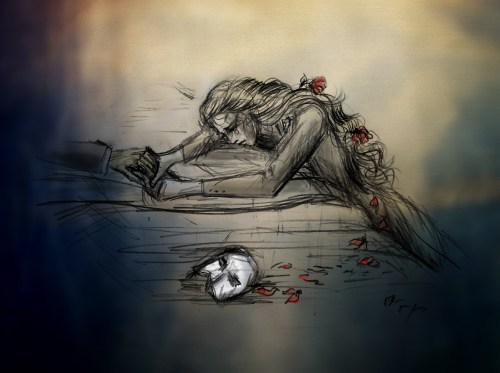
Artwork by @flaviamarquesart
<< Previous chapter
“End of the Ghost’s Love Story” is the most powerful chapter in the novel, because it reveals the full extent of Erik’s love for Christine. It is also the one that makes the story truly extraordinary, because it redeems his character and lifts him above the level of a gothic villain, who is usually defeated and punished in the end. This is why he is generally considered a “Byronic Hero” (https://en.wikipedia.org/wiki/Byronic_hero). The Byronic hero is a complex, often tragic form of romantic anti-hero who is generally more villain than traditional hero, but who has at least one redeeming quality (usually connected to love) which makes him a sympathetic figure despite his flaws and/or crimes. The character type was created by the English poet Lord Byron in his works such as “The Corsair” and “Don Juan”, and became extremely popular in the 19th century. Except for his looks, Erik fits that classic character type in almost all other aspects (highly intelligent, tortured, violent, ruthless, manipulative and driven by an all-consuming passion).
The chapter’s title also makes it clear that the whole thing is a love story at its core - everything in the novel happened because Erik fell in love with Christine. It is, and has always been, the story of Erik’s love - he is the one character we follow up until the end.
The final chapter is narrated by Leroux again, but it draws on what the Persian supposedly told him when he went to visit him in his flat in the rue de Rivoli. When the Persian wakes up after losing consciousness in the water, he and Raoul are resting in the Louis-Philippe room, and Erik and Christine are taking care of them. Raoul has already woken up before the Persian, and is now asleep again.
The room itself astounds the Persian in how ordinary and old-fashioned it looks, and how much it contrasts with Erik’s general appearance (remember that the Persian had never been in Erik’s house before). Erik explains to him that the furniture once belonged to his mother, which explains why the style is so different from his bedroom, which is decidedly more „Erik“. The Persian also wonders why Christine, who is moving silently through the room and then sitting down beside the fireplace, ignores both Raoul and himself when tries to call her. The Persian believes that Christine is reading “The Imitation of Christ”, which is significant and which I will come back to a little later. The “opposites” theme is also present in this scene again, describing Erik’s figure as black and a demon, and Christine’s as white and an angel. The Persian finally falls asleep again.
When he wakes for the second time, Erik has already delivered him back to his flat according to the promise he made to “his wife”. The Persian immediately sends to find out what happened to Raoul, and learns that Raoul has disappeared and that Philippe’s body has been found on the shore of the lake under the opera house. The Persian has no doubt that Philippe was drowned by Erik (or “the siren”), and decides to denounce him to the police. However, his testimony is ridiculed, and he - like Raoul - is taken for a lunatic. The Persian then decides to write everything down and later hands his manuscript to Leroux (which is what we’ve been reading in these last chapters).
When he has finished writing his account down, Erik comes to visit him. He is clearly unwell and described as weak, leaning against the wall and “pale as a sheet”. The Persian accuses him of murdering Philippe and wants to know what happened to Raoul and Christine, whether they are dead or alive. Erik denies murdering Philippe, but the Persian doesn’t believe him. We don’t really know the truth though, so the “murder mystery” has no definite resolution and turns into more of a side note.
Erik tells the Persian that he is about to “die of love” for Christine. As I’ve mentioned before, I believe that the most likely physical cause of his death would really be the gunshot that Raoul fired at him, and a possible infection following that injury which would lead to his precarious state of health as seen in this chapter. This could metaphorically also be described as “dying of love” (because he wouldn’t have caught that bullet if he hadn’t been in love).
After turning the scorpion, Christine begged him to save Raoul, and she had already offered before to accept his proposal if he gave her the key to the torture chamber, but Erik did not care then, because he did not believe her. But when she swears to him that she will become his “living wife”, it‘s different as he finally sees in her eyes what he has been hoping to see - Christine’s genuine commitment. She means to go through with her promise and is accepting him as her husband at that moment - and this is why her commitment is powerful enough to break through to him.
According to their agreement, Erik takes the Persian aboveground, but since Raoul probably wouldn’t agree to leave, Erik drugs him and locks him up in the dungeon beneath the fifth cellar. Then he returns to Christine, who stands calmly waiting for him. Erik suddenly feels “shyer than a little child” as he approaches Christine, but she does not back away from him. He tenderly kisses her forehead and is overwhelmed with how good it feels to kiss her, as no woman has ever allowed him to, not even his mother. Christine even leans into his touch a little, and remains close to him after the kiss, „as if it were perfectly natural“.
Fear and disgust are very powerful, primal emotions, but Christine‘s feelings for Erik are strong enough to overcome both. Considering that no one, not even the Persian, was able to even look at Erik’s face without horror, I feel that Christine must have cared very deeply for him, as she allows his kiss without fear and without recoiling from him at all, even after everything he has put her through.
He falls at her feet and starts crying of happiness, and seeing his tears, Christine starts to cry as well. Erik tears off his mask so that he won’t lose any of her tears on his skin, and still Christine shows no sign of horror or disgust. And she doesn’t only allow him to touch her, but she also touches him of her own free will and takes his hand, saying “poor, unhappy Erik”. I feel that this is the moment when the full expanse of his life’s tragedy truly hits her. She is not only the first woman, but the first person in his entire life to treat him with tenderness and acceptance.
Gratitude and love for her overwhelm him and make him realize that he has forced her choice. He puts the gold wedding ring into her hand, setting her free and telling her that he knows she loves Raoul and that she is free to go and marry him whenever she pleases. He „calmly cuts his heart to pieces“ and puts her happiness before his own in this final expression of true love and sacrifice. For as damaged as he was, the ending proves that Erik truly loved Christine because his love is ultimately selfless. There is also no bitterness in his feelings towards Christine after she leaves - he has always loved her, and still continues to love her. He still feels protective of her: “I’d better not hear that anyone has touched a single hair on her head!” Christine gave him “all the happiness in the world”, and he is grateful to her for this gift. His love for her redeems him as a character and proves to be his moral compass - before, he considered himself “outside the human race” and therefore not bound by common moral values.
In the previous chapter, Christine is shown reading what the Persian believes to be “The Imitation of Christ”. I don’t think that is a coincidence, and I also believe that the name “Christine” was perhaps even chosen for her on purpose (she was originally named Pauline, according to Leroux’s manuscript). Christine becomes a “Christ figure” here in two ways: through her sacrifice, she saves the lives of Raoul, the Persian and everyone in the Opera. But she also offers acceptance and love to a sinner, an outcast who has been shunned by society - and this is an extremely powerful gesture. She possessed the strength necessary to see Erik as a human being, and that is what sets her apart from everyone else. Her love here transcends the realm of romantic love and becomes almost divine - all-encompassing, forgiving, healing.
Christine may superficially fit the traditional image of a “damsel in distress”, but the would-be hero who was coming to rescue her didn’t get very far, nor could he do anything to save her. The only hero who saved Christine was Christine herself - and she also saved everyone else: Raoul, the Persian, everyone in the Opera, and Erik. Both Christine and Erik show incredible bravery in this chapter: Christine‘s bravery shows in her truly accepting Erik as a man and in saving Raoul, and Erik‘s bravery consists in letting her go, relinquishing his one chance in his life of having everything he has ever dreamed of.
Erik then goes to free Raoul and brings him to Christine, where Raoul and Christine kiss. Christine swears to Erik that she will come back to bury him with the ring, and then she finally kisses him before they leave.
Seeing Erik weeping and overcome with emotion, the Persian no longer doubts him. Erik tells the Persian that when he feels he is close to dying, he will send the letters that Christine had left with him and a few of her personal objects to him, and that this would be the cue for the Persian to put an obituary notice in the newspaper so that Christine and Raoul would know. Interestingly, that entire arrangement hinged on Erik himself announcing his death without anyone confirming it, because he could only mail things to the Persian if he was still alive. This leaves a lot of blank space for the reader’s imagination, because who knows if he really died…? The Persian, at least, never saw him again, but announced three weeks later that “Erik is dead”.
Next chapter >>
#phantom of the opera#lerouxreadingguide#leroux erik#leroux phantom#gaston leroux#le fantôme de l'opéra#erik in love#erik x christine#give erik a hug#the ghost‘s love story#the phantom#the phantom of the opera#erik the phantom#christine daae#byronic hero#gothic romance#classic literature#the persian#raoul shoots erik
66 notes
·
View notes
Note
I feel bad discussing spn now that’s over but I’ve been wondering. Do you think dean actually meant it when he said “why does that something always seem to be you” (15.03)? Usually people blurt out what’s on their mind all of a sudden even if they didn’t mean to say it out loud. But it comes out because the person either thinks about it or actually believes it. Do you think at one point Dean truly blamed Cas for Mary? I mean, putting 15.09 aside of course.
Why do you feel bad discussing SPN now the show’s over, anon?? Don’t feel bad!
The short answer to your question, in my view, is that Dean was lashing out because of how his unaddressed trauma over Cas dying (cf. 7x01, purgatory, 12x23) gets entangled with him processing his grief over Mary and Jack. Everything is further exacerbated by Chuck’s villain reveal, and the events that lead to Rowena’s “death.”
The longer answer to this question starts with acknowledging that feelings and trauma are complicated things that aren't always rational. And that's the crux of the matter for Dean in that moment he lashes out at Cas: he's not behaving rationally. We know Dean is angry, and historically doesn't handle anger well at all, but we also know, even without 15x09, that what Dean is really feeling is fear. In that moment, Dean is angry, and he's scared. If you watch the scene closely, too, you'll notice that Dean is still present enough to regret saying "why does that something always seem to be you" to Cas. He tenses up, he looks down and only looks up again in stubbornness defiance when Cas says he can't even look at him. Then Cas leaves, which has always been an issue for Dean. However warranted Cas's decision to leave was, it still hits Dean as rejection, too. All this is to say that the break up scene is extremely fraught, and Dean is the type of person who needs time to process events and emotions, and time to process is something he hasn't had since Mary disappeared.
So you ask: ok, cool, but what does all of that have to do with Cas dying, Liv? And here's where I say they have everything to do with Cas dying. I've talked about this before in tags and in other posts that I can't think of right now, but there are common occurrences in the events that have led to the more traumatic Cas deaths. If we think of Cas dying in 07x01, the context for that is as follows: Cas needs to solve a problem, he wants to ask Dean for help, but the desire to not burden him with it is greater, so Cas ends up handling the problem solo, which leads to disaster and also him dying. Or, well, apparently dying. But as far as Dean was concerned, Cas was dead, and he did struggle with it a lot during season 7. Now, fast-forward to s12 and the context of how Cas ends up dead then: Cas needs to solve a problem, part of him does want to cooperate with Sam and Dean to solve it, but he ultimately decides his desire to bring Dean a win, and to shield him and Sam from actions they'd suffer from are greater. Predictably, Cas ends up handling the problem solo, which leads to complications, and him being killed by Lucifer. Cas's death in 12x23 is significantly more traumatic to Dean than the one in 07x01 as season 13 starts with a grief arc that is devoted to Dean's suffering over Cas -- to the point that suffering overshadows even his grief over Mary. Granted, these are somewhat reductive summaries of the events of seasons 7 and 12, but the fact remains that those two deaths were remarkably similar as well as traumatic.
If you look at trauma theory in regards to literary analysis, you'll notice that a key element is repetition. The story of trauma is a story of echoes, which is partly why triggers are what they are for people who have PTSD. In particular, a situation doesn't need to be an exact replica in order to evoke a traumatic memory. A situation need only be similar enough to the traumatic event to cause a trauma response. Therefore, if we keep in mind that the events leading to 15x03 aren’t exact mirrors of 07x01 or 12x23, but too reminiscent for comfort, then Dean’s behavior toward Cas starts making a bit more sense -- not excused, but understandable. A quick summary of these similarities goes as follows: Cas notices there’s is something off with Jack because of his soul; he decides to investigate on his own to avoid worrying the Winchesters and also because of his own fear of losing his family. He only comes forward with what is happening after something potentially disastrous has happened (Mary’s death). Later, Cas deviates from the agreed plan to close the wound leading to hell, which leads to another disastrous consequence (Rowena’s death). What does this look like? Cas makes a decision to act on his own, and doesn’t tell Dean (or Sam) about it, something goes wrong, someone dies. Notably, here, moreover, is that Cas obviously doesn’t die, but he has paralleled Mary before (when he was dead in s13) and there’s an argument to be made that he would eventually parallel Rowena (with heaven), but that’s from a metanarrative perspective rather than Dean’s, and I digress.
Oh, It’s worth noting, too, that the way in which the arc starting with 14x18 and culminating in 15x03 presents a similar, but not quite, chain of events as those of previous seasons signals the intentionality of the trauma narrative.
But anyway, as we were: the resonance between the traumatic and triggering events, with the latter being traumatic in their own way, make Dean response in a way that is unfair for the situation at hand, but betray a deeper truth about Dean’s state of mind. Backtracking a little from 15x03, the first instance of Dean lashing out at Cas happens in 14x18 with the (heartbreaking) line: “Then you're dead to me.” At face value, those words are a condemnation of Cas and indicate a complete breakdown of the relationship, hinging on Jack having hurt/killed Mary. There is, however, another angle there, pain simmering beneath the surface, which makes more sense in its direction to Cas: the last time Jack, Mary, and Cas were involved in a tableaux like this, Cas died and Mary was gone. In what is an inversion of events, Mary is dead and Cas is...there, but as an echo of Jack’s birth, to say Cas is dead is a statement of fact: he did die, then. And as he was a parallel to Mary in the aftermath of Jack’s birth (and the rehashing of the John, Dean, Sam drama through Dean, Sam, and Jack), so is he a parallel to Mary here, except in circumstance. Both Mary and Cas had been after Jack. Mary happened to find him first, but Cas could’ve easily been the one to find him. Easily been the one who died. See the issue? This is obviously not to say that Dean’s grief and rage weren’t about Mary herself, but that the situations are entangled and murky.
Further entanglement and murkiness happen when Cas is forced to change the plan to seal the hell wound in 15x03. We all know, including Dean, that there was nothing Cas could’ve done instead of what he did. But besides the change of plans, there’s an undercurrent of anxiety of the wound closing before Cas makes it out. He does, of course, but that’s the what if, always. And to illustrate the possibility, Rowena sacrifices herself to close the wound. It’s not coincidence that the similarities here are tenuous considering the stress burden from everything that has happened since 14x18 has continued to grow with no respite.
The stage is set then for the confrontation that leads to Cas walking out of the bunker. Dean is clearly on edge, and Cas is in a particularly vulnerable and hopeless headspace:
CASTIEL: Sorry about Rowena.
DEAN: You're sorry? Why didn't you just stick to the damn plan?
CASTIEL: Belphegor was lying.
DEAN: Belphegor's a demon.
CASTIEL: He was using us. He wanted to eat every last soul to take over Hell, Earth, and every...
DEAN: Yeah, and we would've figured it out... after. With Rowena.
CASTIEL: The plan changed, Dean. Something went wrong. You know this. Something always goes wrong.
DEAN: Yeah, why does that something always seem to be you?
The reason I went of this long journey to come back to this is so as to make clear that what Dean is talking about here isn’t about Rowena at all, and it’s not about Mary either. We know Dean didn’t really blame Cas for Mary, and that he didn’t blame him for Rowena, either. But do those bolded parts sound familiar?
CASTIEL: Listen. Raphael will kill us all. He'll turn the world into a graveyard. I had no choice.
DEAN: No, you had a choice. You just made the wrong one.
CASTIEL: You don't understand. It's complicated.
DEAN: No, actually, it's not, and you know that. Why else would you keep this whole thing a secret, huh, unless you knew that it was wrong? When crap like this comes around, we deal with it... Like we always have. What we don't do is we don't go out and make another deal with the Devil!
CASTIEL: It sounds so simple when you say it like that. Where were you when I needed to hear it?
DEAN: I was there. Where were you?
DEAN: You should've come to us for help, Cas.
How about:
DEAN: Cas, you can't – With everything that's going on, you can't just go dark like that. We didn't know what happened to you. We were worried. That's not okay.
CASTIEL: Well, I didn't mean to add to your distress. I – Dean, I just keep failing. Again and again. When you were taken, I searched for months and I couldn't find you. And then Kelly escaped on my watch, and I couldn't find her. And I just wanted I needed to come back here with a win for you. For myself.
[...]
DEAN : We will find a better way.
CASTIEL: You mean, we?
DEAN : Yes, dumbass. We. You, me, and Sam, we're just better together. So now that you're back, let's go, Team Free Will. Let's get it done.
CASTIEL: I'd like that.
DEAN: Great.
“Then, you’re dead to me.” “...why does that something always seem to be you”
Because it’s Cas, and Cas being dead and gone. The tragedy of the divorce arc is that Cas ends up gone, too. However, this time, it’s Dean’s fault for not stopping him. Here, Dean’s fear of Cas dying leads to the anger that ultimately pushes him away. So, yeah, Dean meant what he said, but not in the way Cas took it. Not in the way it appeared as.
The other tragedy of Supernatural ending as it did is that Dean never got to heal from that trauma, he never got to confront Cas for it, either. Make no mistake, the empty deal is another spiral of Dean’s unaddressed trauma over Cas dying. The beats are the same, and the result is Cas, gone, and Dean, shattered. Sadly, we never got our final resolution, the climatic reunion that would mirror Dean’s prayer in purgatory and Cas’s confession in the dungeon. It’s a story left unfinished.
#destiel#dean winchester#deancas#supernatural#spn#spn meta#questions and answers#my writing#i keep saying the remaining huge piece of unaddressed trauma from dean is cas's death#remember that thing i keep repeating about dean's unaddressed trauma re: cas?#as you can see i do yell about this a whole lot#this thing got SO LONG ANON IM SORRY#ksjdhfkasjhfklasd#hopefully it's helpful?
320 notes
·
View notes
Note
Tell me about the corruption arc Bestie
oh bless you are going to get Such a textwall and i do not even care
what i am currently most emotions about is. how Revan's entire outlook shifts so gradually through the war that she doesn't even realize it's changing/changed! like, she gets to this point where she ends up literally not able to completely remember why she went to war in the first place - it was about revenge, wasn't it? wasn't it? hasn't it always been about- saving the galaxy and about destroying the Mandalorians and about winning?
and like! it hasn't! when she first went to war it was out of compassion, it was this determination that she would do the right thing when no one else would, because the galaxy was being BROKEN and no one was stepping up, and what are Jedi if not compassionate, and what are Jedi if they do not stand by the oaths they took when they were knighted? and like- yes, she was determined to win, but she was determined to win so that no one else would suffer the way the Cathar did, so that she could find justice for their deaths, and the line between justice and vengeance can be so blurred at times but there is such a clear difference at the same time and what Revan ended up doing at Malachor- it's the latter, not the former. violence begets violence begets violence and it's a cycle and in committing a genocide against the Mandalorians to make them pay for a genocide of the Cathar it's just perpetuating this cycle, and early Revan would've- seen that, or at least known it wasn't the right way to end this!
but she gets so caught up in her own legend that she loses all of it. like- how to put this into words in a way that isn't just exploring it through prose. she has the mask and it's originally the symbol of her promise, of her commitment, but it becomes this symbol for her and for her victory from the moment she wins her first battle with it, and the Jedi who follow her, who took her name as their cause, they already see her as their leader. and the Republic starts talking about her as a hero and tying this all to the mask, and it just keeps getting worse and worse as she wins more and more because she is being heralded as this savior and she was told from a young age that she was meant to save the galaxy and she'd never thought it was true, not really, but now- well, she starts to doubt. she starts to believe, maybe, that she really is meant to
and like. the sacrifices are such a huge part of this, i don't know if i can completely explain it. Cassus Fett is out here constantly pushing her to see how far she'll go, and the problem is, the strategies work. she uses people as pawns and it's this constant. sacrificing the few to save the many, and it works but it takes its toll on her. it gets her seeking out absolution from Alek and it gets her justifying it to herself as sacrifices are necessary in war because sometimes, sacrifices are necessary for the greater good and war, this war, is for the greater good, so it follows from there, and originally it's a justification but she comes to believe in it because her sacrifices are winning, not just battles but the war, and she's constantly being told by so many people that she is saving the galaxy and it all just- sinks in. and the mask becomes her in all the ways that matter, because she cannot stay human and cope with everything she's done, everything she's killed.
and also! she has to be right at all times. every decision she's made in this war, it has to be the right one, because if it isn't - if she was wrong - she made these choices for her pride and her pride alone, and she can't handle that. she has to be Right and the Mandalorians, especially Fett, have to be Wrong, and she can't see any shades of grey in this (despite Everything she does being this mess of grey) because she can't confront the fact that her own pride is what lets her really lean into this savior thing. she has to be better than the Mandalorians because if she's not-
if she really is the same as they are, then what was all of this for?
and like. she is angry, she is arrogant, she is proud, these are her flaws, her faults, and combined with this desperate need to prove herself that stems from how she was always regarded as too angry and too attached and too dark by a lot of the Jedi growing up, especially a couple certain masters who i will not name but would like to murder, it all just snowballs into this. she has to be the legend because she has to prove herself and also she needs to Win and she needs to be Better and she needs to do all of this and she physically cannot do it as a human. so she makes herself both more than and less than one. and more than this, like! there's this whole thing where. she cannot accept responsibility for her own role in all of this. she cannot lay the lives of everyone she's sacrificed for her victory on her own shoulders, otherwise she will break, because she is twenty-two years old when she goes to war and twenty-five when she gives the order to activate the Mass Shadow Generator and that same compassion that led her to go to war makes it impossible for her handle the Guilt of everything she's done.
so she turns. and she lays it all at Cassus Fett's feet. because he is the one who drives her into these sacrifices and he is the one who pushes her and he is the one who- on and on and on, she turns him into the villain and the scapegoat and like - yeah, the Mandalorians are at least half at fault for all this, but no one is forcing her into this. (except Vitiate, all of this has been Vitiate from the very beginning, and that's why it's all a tragedy because there were no right answers and at the same time Everyone was right and there was never any other way any of this could end - Revan will always go to war and Alek and the Exile will always follow and Malachor V will always burn) she makes Fett into the personification of all her guilt and she turns it all into anger and she declares that she will get revenge on him for everything he's made her do and so she kills her guilt in the dirt on Dxun, stabs Fett through the gut with his own spear and takes the breastplate off his still-living body to turn into her own armor as proof of her victory, and in his final moments he tells her that they are the same and she looks at him and says that is why you have to die because no one, no one can know that in the end, she Is just like them. that when pushed into a war, she fights for the thrill of battle, that she wants the victory more than she wants anything else, that she is no longer a Jedi and she isn't sure what to do with that.
Fett dies, and then Revan turns, with a golden beskar breastplate and a red sash added to her black robes, and she goes to Malachor V and she kills Mandalore and she shatters the Mandalorians into dust for all their crimes (for all her guilt) (for all her rage and bitter determination and the last dying shards of her compassion). a planet dies, the Mandalorians die, and a war is won and the Republic is saved but that isn't enough. it's not enough. she no longer knows how to be at peace, she has turned herself so successfully into the mask and the legend that without the war she does not know how to exist and so she- goes to find a new one, because the galaxy isn't ever going to be saved.
and the worst part of all of this is- there's this moment, this battle. the second battle of Althir. she's been making bigger and bigger sacrifices but she's never directly fired on her own people before, but this battle - it was all a trap, of sorts, and she is losing, and there is this moment in which she has to choose between a strategic retreat to save her fleet and her people, or a victory, or winning even though it means deliberately killing tens of thousands of her own people to do it. and it's sort of this point of no return for her when maybe things could be different - maybe she could turn back, maybe victory doesn't have to be all-important to her - and then they can't, and she can't, and it does. and she gives the order to kill off a third of the ships she has with her for that victory.
and she does not mourn it.
because sacrifices are necessary in war.
and in the end, living up to the legend she's made herself into - being it, completely and utterly - has become the most important thing to her, more important than saving lives.
and this - it's why she falls, in the end. she makes the conscious choice to become Sith (she was very much hovering on the edge of the Dark, but she wasn't completely fallen) after escaping from Vitiate, because the Jedi weren't strong enough to defeat the Mandalorians, and like - it's not the same, but also, yes it is. it all leads here. everything she has ever gone through leads to this moment, standing on Korriban, surrounded by dust as red as the blood that soaked it a millennium ago with the cold wind stretching her cloak out behind her, when she ignites her violet lightsaber and names herself Darth Revan.
(Revan, still, because her name is not a name, it has not been a name in years, her name is a title in the mouths of her Jedi and her soldiers and her enemies, Revan, Revan, save us, Revan, kill us, Revan, lead us to victory.
and she will.)
#you are getting the Whole Ramble i am not ashamed of this#ramblings#long post#kotor#darth revan#you really did not specify you just said tell me about the corruption arc#well#now you have. probably 2k words about the corruption arc#ENJOY THEM#:)#god i could get more into this in depth but i would need to start pulling sections of prose and also detailing out specific battles#and i was Trying to write this as a summary lol#hmmm this probably qualifies as#my writing#it's prose enough i suppose#have fun reading the novel
59 notes
·
View notes
Text
Bakugou Katsuki is not as bad as he seems.
Okay, fine. That's a lie. Bakugou is a loud and obnoxious asshole with little to no character development and will snap at anyone who breathes on him the wrong way.
Now that that's out of the way, let's move on to why he's like that.
You all know what PTSD is, yeah? If not, it stands for "Post-Traumatic Stress Disorder". It's something that causes panic attacks, unnecessary aggression, trust issues, nightmares, anxiety, depression, and more. People will develop it after a traumatic experience. It takes years of therapy to recover... actually, most people never recover from it.
Fun fact: Katsuki canonically has PTSD. It's confirmed, and you know what? After everything he's been through, it's not much of a surprise. He's been through one tragedy after another and never seems to get a break.
When we first met Bakugou Mitsuki (Katsuki's mother) in chapter #96, we instantly realized how aggressive she was. I mean come on! She talked smack right in front of him and his teachers- in front of All Might who she knew her son was very fond of. Katsuki may be irritable, but to have your own mother backhand you in front of your own role model is a little much.
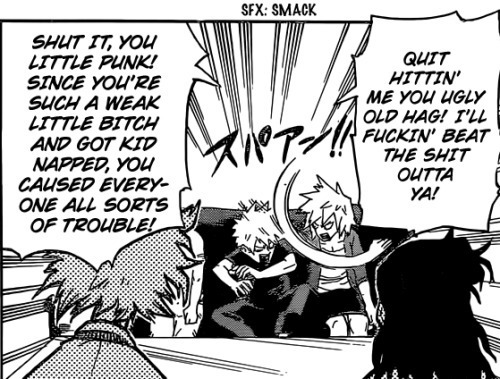
Later on in chapter #165 during the Provisual License Exams, we get a little more information that only points towards more abuse- and this time it's not so verbal.
Most people paid no real attention nor gave it a second thought in these panels, but remember when Katsuki suggested to use violence against the kids? Of course, you'd look at it and wave it off as "normal Bakugou behavior", but what he says next took me by surprise:

That's right. He was raised that way.
Which means either Mitsuki or Masaru (or both) had struck him in some way multiple times as he was growing up, and I doubt it was Masaru.
"Spoiled" my ass. He might have a strong quirk, but people don't turn into little monsters just by being praised. It'll definely boost his confidence, but not dramatically. This could also explain his aggression toward Midoriya. He realized how helpless he was and had power over someone else for once. But that's just a theory.
Okay, let's fast forward a bit. He's finishing up his third year of Middle School and is preparing for the UA entrance exams. He's pushed away his childhood friend to follow his own dreams and tells him to jump off the roof.
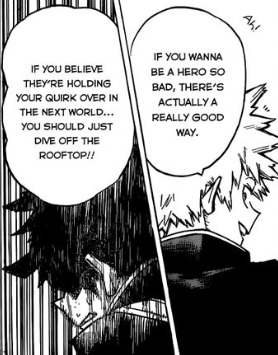
Literally.
And then he walks out the door only to regret it much, much, muuuch later in the series- y'know. The "character development" I was talking about.
Next time we see him though, he gets what he deserves.
One panel he's tramping through an alley with his friends, and the next, he's being swallowed alive by the most perverted-looking slime monster I've ever laid my eyes on.

While Izuku's dreams are being crushed by his own hero, Katsuki is fighting for his life in the middle of town. He's struggling, but all he could do was look back at all the dozens of fearful eyes...
Right there. Right now. Look at him:
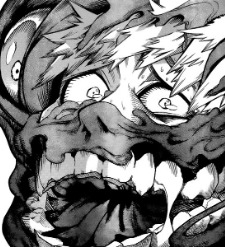
He's terrified. He's humiliated and afraid and hurt and despite all of the heroes that were there, none of them had even attempted to save him.
And this is where it really starts. This is where it all begins. Next thing we know, Izuku's running straight for him... The boy Katsuki's bullied almost all of his life is risking his own in order to save him.
You know the story from there; All Might trains Izuku to withhold his power, they get accepted into UA, and then comes the Sports Festival.
Katsuki's already made up his mind: he's gonna win. He's willing to give everything he has to show the country what he's made of, and this may be his only chance to make up for the mishap several months ago. And Monoma, being a professional at making things worse by opening his mouth, rubs salt in the wound.
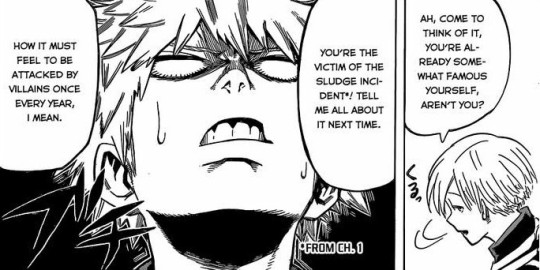
It was pretty easy to predict Katsuki's reaction: pissed off and more than ready to prove him wrong. He does, but it cost him his "first place" during the Calvary Battle. But that's okay 'cuz it's not over yet!
Welcome to the next and last stage of the festival: The Battle Tournament, where all the kids get to beat the shit out of each other until only one remains.
Turns out, Katsuki does win. It was a foolproof plan: get Todoroki to go all out on him so he can make a final impression before the end of the day. But it was obvious that Shouto was still unsure of himself, so Katsuki did what he did best:
He had to piss him off.
But instead of getting angry and bursting into flames like he had planned, Shouto threw away the battle at the last second, and everything Katsuki had worked for with it.
No shit he's gonna be upset! He worked his ass off to get where he was, and the whole point was to leave himself a footprint! His entire life had been dedicated to that moment, and it faded away right in front of him.
Midnight put him to sleep and he woke up and threw a temper tantrum.
Now this is was UA did wrong:
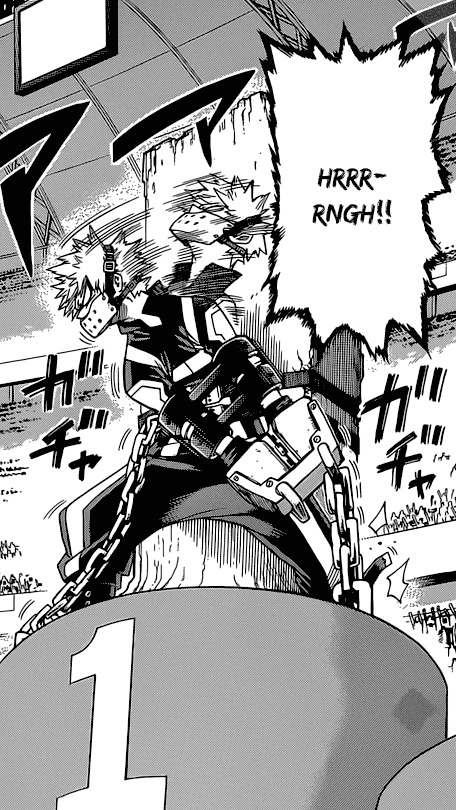
Why would you do that?! They were all aware of what happened to him only a few months ago, he obviously hasn't properly recovered from it, and they restrain him in front of thousands of people. They cover his mouth and gag him, lock his hands in a tiny metal box and expect him not to go insane. Helloooo?! Wake up! He's just a kid!
Several months go by and now it's time for camp. Katsuki is tired. They all are. It's been a long day of training and training and training, and suddenly villains come out of nowhere, and nobody is prepared. And who shows up? The League of Villains, and they're after certain students...
Tokoyami escapes safely, but Katsuki isn't so lucky.
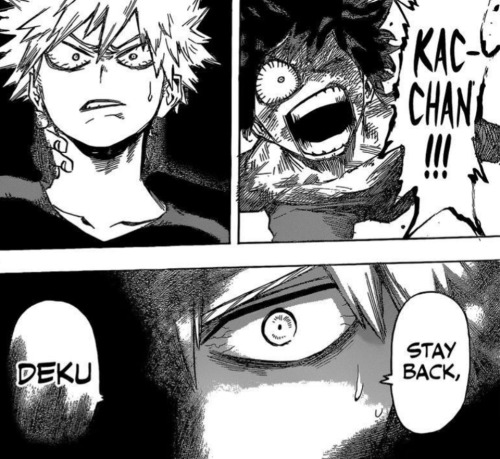
Just think about that for a second. When we see Shigaraki holding a picture of him, it's the one where UA tied him up. He knows what this child has gone through and he pities him. To be honest, I think the LoV treated him much better than anyone ever has (except maybe Kirishima). They're hesitant, but they treat him with kindness. They didn't just want him for his quirk. They saw what the heroes did to him and wanted to help him get the revenge he deserved.
But when All Might showed up (more like "burst through the wall like the Cool Aid man"), Katsuki is instantly teleported in the strangest way possible... and the most traumatizing.
He chokes out this weird slime-like substance that devours him within seconds. Thankfully it only last that long, but then again, the Sludge Incident, remember?
Yeah, bet that brings back some memories.
But what must have hurt him the most was All Might's downfall and early retirement. He said it himself:
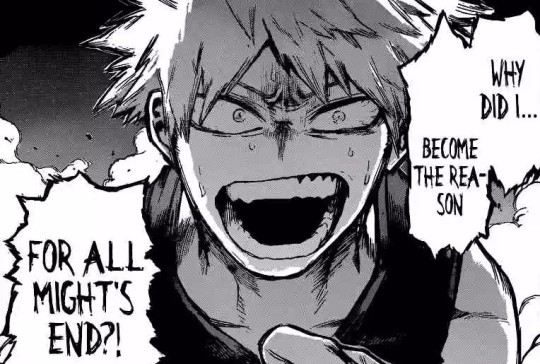
After several chapters, he finally burst. He's been holding all the pain inside of him until it bubbled over and he couldn't take it anymore. So he went to the only person he could- the person he hated and yet trusted the most.
Maybe the Class 1A concert helped him in a way. It seemed like it brought him down and maybe even relaxed him a little. And something incredible happens. Something we haven't seen from him at all until now...
(From here, I'll try to keep it short to avoid as many manga spoilers as I can. That and I'm tired...)
He began to change; started to support Izuku... in his own twisted way, of course. As chapters went by, he started to open up little by little. He admitted what he had done to Izuku in middle school to All Might, which had brought him some peace of mind. It wasn't quite the apology we had hoped for, but I guess it'll do.
And during the war, he made the greatest sacrifice, finally unlocking his quirk's full potential. Despite being unable to move, he used his quirk to throw himself in front of Izuku without thinking, taking a blow to his stomach. To his stomach.
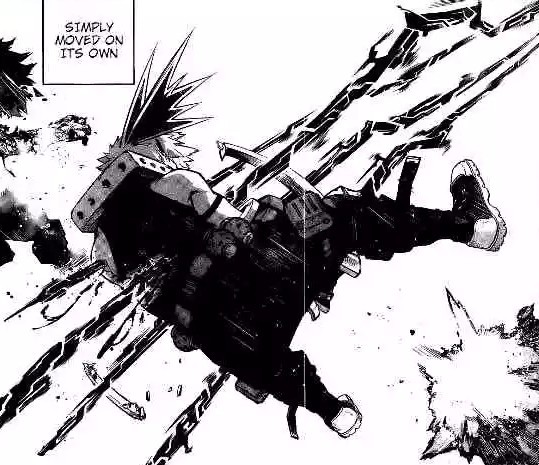
He was impaled.
Holy shit.
Last time someone had been impaled was Nighteye, and he died from his wounds.
But Katsuki somehow managed to survive... And woke up ready to beat Izuku's ass if he didn't wake up.
Anyway, that's all I have to say (so far). However, I'm excited for Season 5 of the anime series! Can't wait to see our new story animated! I mean, I've been watching the episodes as they come out, but still.
-Blightcon
#my hero academia#boku no hero academia#bakugou katsuki#kacchan#midoriya izuku#deku#all might#bakugou mitsuki#bakugou masaru#todoroki shouto#Utsushimi Camie#tokoyami fumikage#the thoughtbox
70 notes
·
View notes
Text
Restless Rewatch: The Untamed Episode 16 part one
(Masterpost of All the Recaps) (Canary’s Pinboard)
Warning: Spoilers for All 50 Episodes
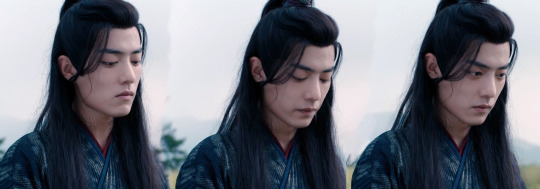
All righty, this one is going to be a laff riot...not. Let's do it.
The first half of this episode is like a beautifully executed standalone tragedy, while also threading together all sorts of themes and paying off all sorts of relationship building that's happened in the previous episodes. My hat is off to the writers, while I also shake a fist at them for making me cry an unreasonable amount.
We’re Sailing on a Strange Boat
The episode starts right off absolutely DESTROYING me with the Yunmeng brothers holding hands, fingers interlaced, in the first of many hand-touching moments that punctuate the episode.
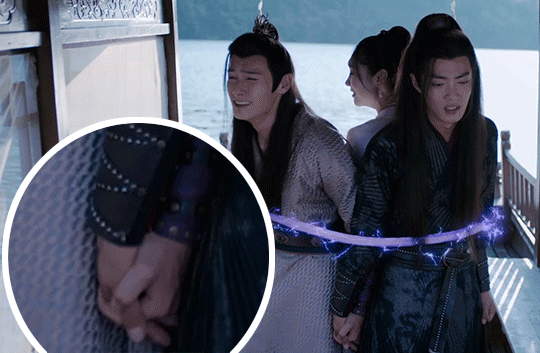
Jiang Cheng has to be pretty far gone to accept this degree of comfort and tenderness. I think, from their positions, he is also holding Yanli's hand out of the camera's view.
Zidian finally lets the trio go, and they immediately turn the boat around and head back to Lotus Pier. Wei Wuxian gets the clever idea to turn the benches into makeshift oars but nobody gets the clever idea to use magic to push the boat like they do literally every other time they are in a boat.
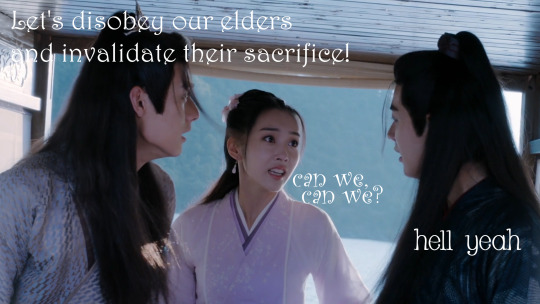
Their emotional need to go back to Lotus Pier is understandable, but they are being disobedient and irresponsible by doing it. Jiang Cheng is the future of the clan, and should not risk his life, particularly after his mother chose to sacrifice herself to protect him and after both of his parents told him to go hide with his sister and personal bodyguard brother.
On the other hand, Jiang Fengmian, as clan leader, probably had a duty to go into hiding himself rather than go home to die romantically, so his authority is questionable at this point. Anyway, this is the Jiang Clan, they get to kind of do what they want, except when that pisses Jiang Cheng off.
Lotus Pier Massacre
Back at Lotus Pier, the Wens are kicking Jiang ass. The fight choreography is pretty good, taking full advantage of walkways, railings, pools, and other features of the environment.
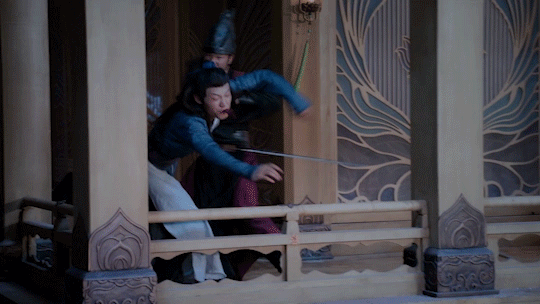
Using the set this way always makes fights feel more kinetic and real, as opposed to simply sparring in an open area.
(more after the cut)
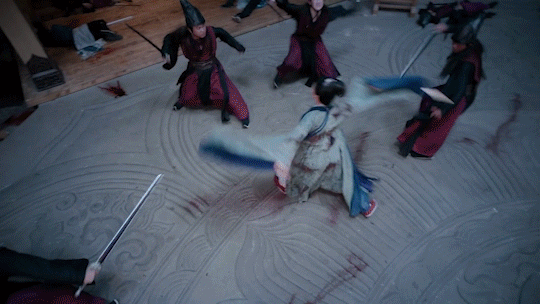
Yu Ziyuan is fighting adequately with a sword, having given her preferred weapon to her son. She's clearly been at it for a while, and is tiring; the Wen soldiers are starting to land more and more sword blows but no critical hits yet.

Wen Zhuliu is kicking ass and possibly melting cores, although we don't see him do it to anybody yet. Later we'll hear from Jiang Cheng that he crushed the cores of his parents, but it's not clear when that happens.
Sixth young master replays Jiang Fengmian's entire archery lesson in his head while he waits, and waits, for Wen Zhuliu to finish strangling a dude the right moment to shoot an arrow at Wen Zhuliu.
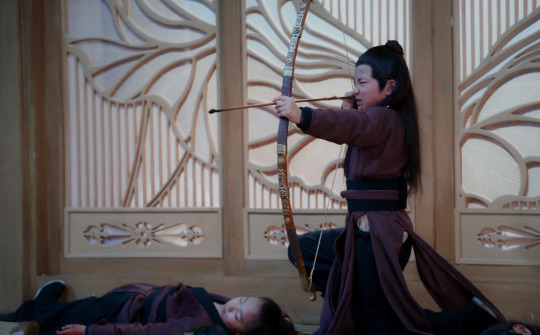
Homicidal tart Wang Lingjiao notices him lining up a shot, strolls over, and stabs him in the back while he's still thinking about what Jiang Fengmian said. One could wish that JFM's archery lessons weren't quite so wordy.
Wang Linjao normally doesn't carry a sword because of her low spiritual power, but apparently can use one just fine when she's killing kids.
If you start feeling like this episode is unreasonably painful, just think of it as building up calluses so you can handle Yi City when the time comes.
Jiang Fengmian to the Rescue
Jiang Fengmian shows up very far past the nick of time, although he is not actually useful, so it's questionable whether arriving earlier would have helped. But his wife is glad to see him.
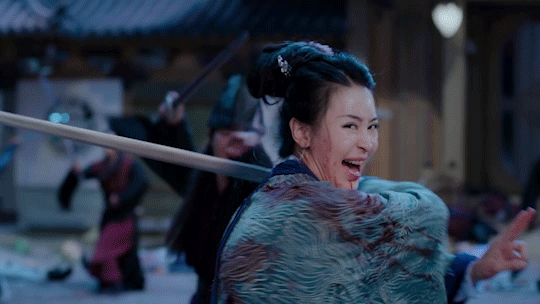
Netflix subtitles say that Jiang Fengmian calls Yu Ziyuan "My Lady!" which sounds courtly and romantic in English. His actual words are "San Niangzi" which hunxi-gullai breaks out here. I might render this as "lady wife!" rather than "my lady" but I don't think English really has a perfect equivalent.
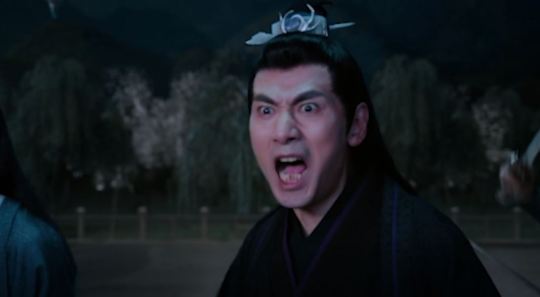
Jiang Fengmian sails across the courtyard, knocking down a few Wen soldiers and becoming a young, slender man in the process.
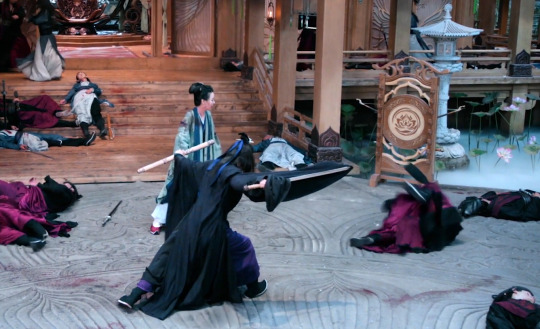
I mean, come on, that stunt double does not look like a boxy middle-aged man from any angle.
The Dying Bit
The episode splits up the big death scene for dramatic effect but I'm recapping it all together to keep things simple.
Within moments of arriving, Jiang Fengmian gets shanked by Wen Zhuliu like Scatman Crothers in The Shining (or Groundskeeper Willie in The Shinning).
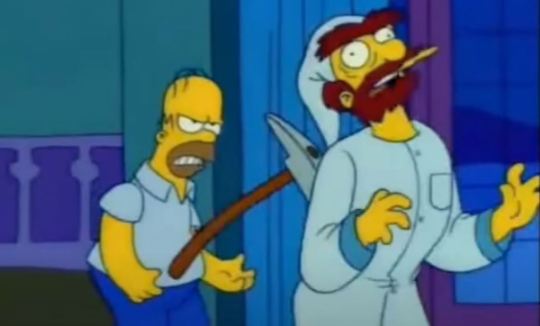
Wen Zhuliu stops a Wen soldier from finishing JFM off, just so that a different Wen soldier can deliver the killing blow from the back, which is kinda harsh. With all this spin-fighting there is probably not an implication of cowardice when someone dies from a stab in the back, but still. Too rude, Wen Zhuliu.
Yu Ziyuan sees Jiang Fengmian fall, and after having a moment of sorrow and despair, she stabs herself in the heart, falls down, crawls to him and interlaces her hand with his. He revives just enough to give her hand a squeeze and say "San Niangzi" one last time before dying.
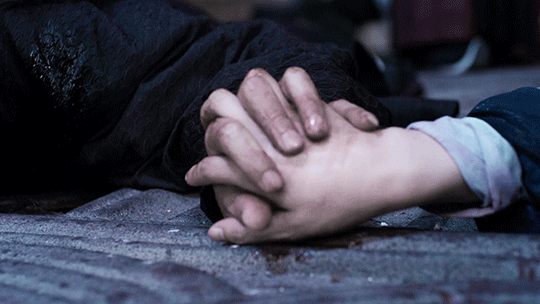
She dies next, with a smile on her face at the end. The soundtrack plays that amazing "horribly emotional death scene" music that isn't one of the tracks available on the OST, argh. This same music appears at the end of Xue Yang's story.
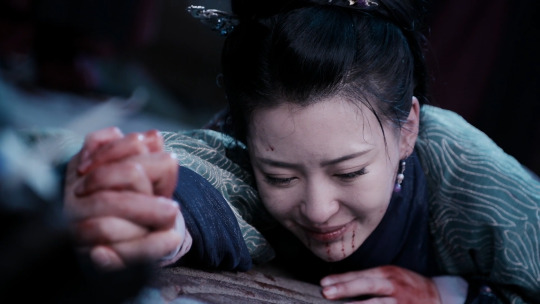
Of the many things I love about the Untamed, the complexity of all the minor characters is possibly my favorite. These two people suck at parenting, and suck at being married, and ultimately suck at protecting and leading their clan, making stupid, selfish choices at every step of the building conflict.
And then they have this incredibly romantic death scene, in which they both face the inevitability of failure, and find comfort in failing together. Yet their death scene is totally in keeping with who we know them to be, and who they are to each other; the drama doesn't cheat by making them ideal lovers or great people at the end. But they have a great, great moment.
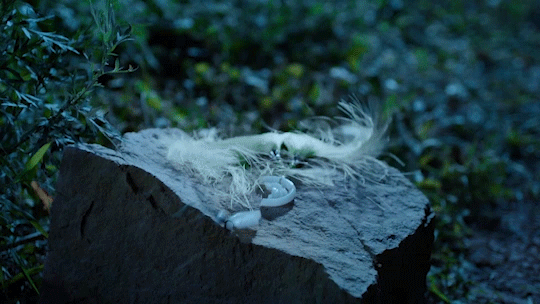
Jiang Yanli, waiting in the woods while her brothers are presumably running toward Lotus Pier, drops her lotus pendant, which is made of the loudest jade ever discovered, and it breaks with a crash.
Yanli, who is a well educated young lady, knows a moment of doomy symbolism when she sees it.

Jiang Yanli: Who put a giant rock out here in the woods? What are the odds I’d drop my pendant directly on it?
It’s all Over Except for the Crying, Running and Choking
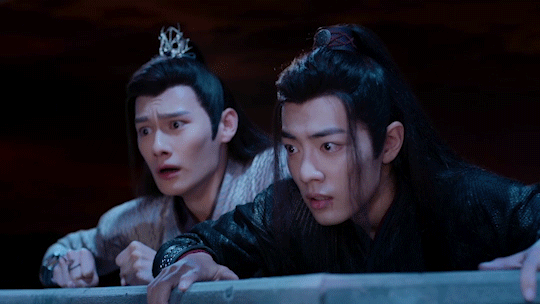
The brothers climb up on the roof and are shocked to see nothing but Wen soldiers and piled up Jiang corpses...
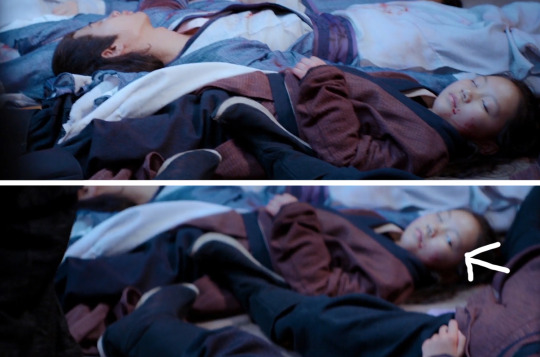
...including one child who is either about to become a zombie or who is being played by a young actor who can't control their curiosity, judging by the way this eye is sneakily opened while the camera is running.
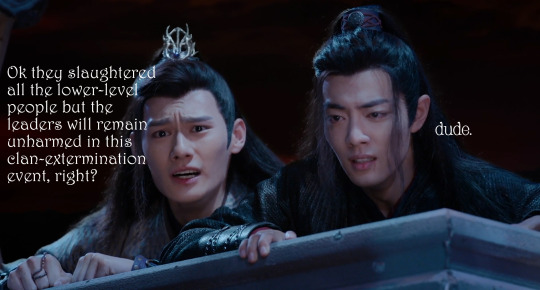
There's a moment where Jiang Cheng is saying they must have spared his parents, they must be okay, where Wei Wuxian's face is just...wow. You can see right here the gulf in life experience between these two.
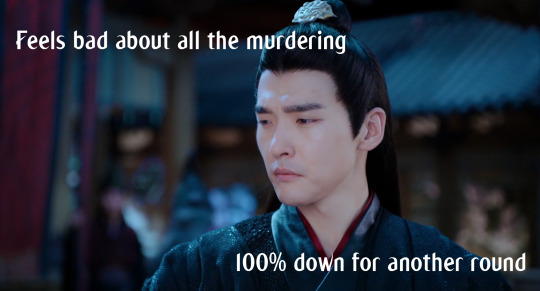
Wen Zhuliu roams around looking troubled while searching for more people to kill. He’s an interesting villain; someone who believes his loyalty to his boss makes him a good guy, but knows his boss is a bad guy.
Then we are treated to a hell of a camera move, where it tracks over Yu Ziyuan and Jiang Fengmian together on the floor, heroic in death and still holding hands, and then sweeps up to show their killers sitting on the lotus throne.
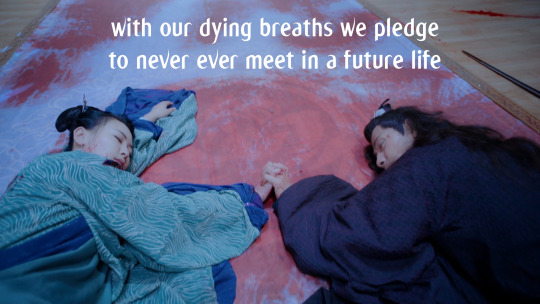
The dead couple were at odds for their whole lives together, while the evil people who killed them are acting like devoted lovebirds. It's a stunning shot and a terrific thematic contrast. When Wei Wuxian eventually comes to take his vengeance, he will spend some time turning Wen Chao and Wang Lingjiao against each other, before ending them.
The camera shows us JC's reaction, then shows his mother, then WWX’s reaction, then JF; each reacting to the death of the person who loved them. Some folks may feel that Jiang Fengmian actually did love Jiang Cheng but was just bad at showing it. But Jiang Cheng doesn't think so, and I don't think it's a given that parents love their children.
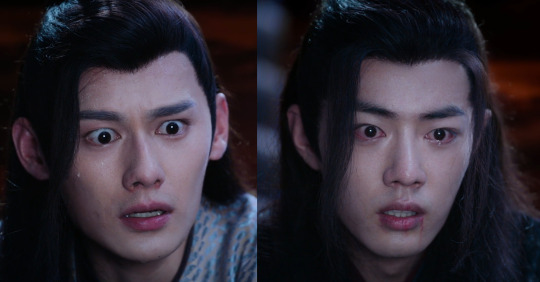
Side note: Macroexpression king Wang Zhuocheng is able to open his eyes so far that a giant strip of white shows above his irises, and keep them like that, which is quite a trick. Try it yourself.
Meanwhile Wang Lingjiao and Wen Chao gossip about YZY and JFM's bad marriage. Wen Chao admires YZY's beauty, and Wang Lingjiao insults her character, and announces that she's going to stab YZY's body a few extra times. Jiang Cheng briefly faints at this, taking a page from Wei Wuxian's book, and rolls off the roof.
Run Run Away
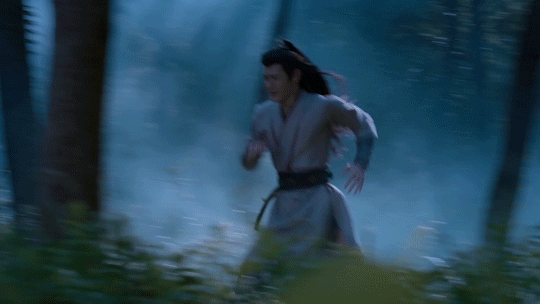
Both young men run, and run, and run away from Lotus Pier while Wen Chao and Wang Lingjiao mistreat the bodies of Jiang Fengmian and Yu Ziyuan
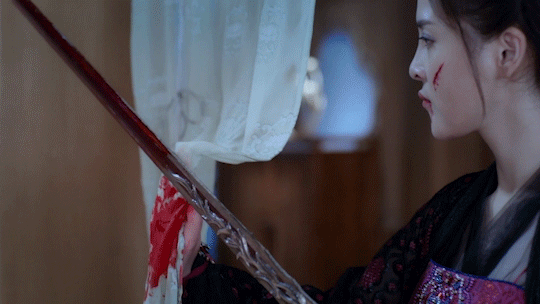
The stabbing happens off camera, because it's ok to stab a live child on camera, but not a dead adult. (As always, there are cultural reasons for "what's ok" in any country, and I'm not saying anybody's wrong about these choices).
Wen Chao follows this up with pouring a cup of wine across their faces. He does this in the style of a libation for the dead, but as a desecration, combining mistreatment of bodies with profaning a ceremonial rite. In a world where ghosts are real and have sharp fingernails, this is deeply, deeply stupid.
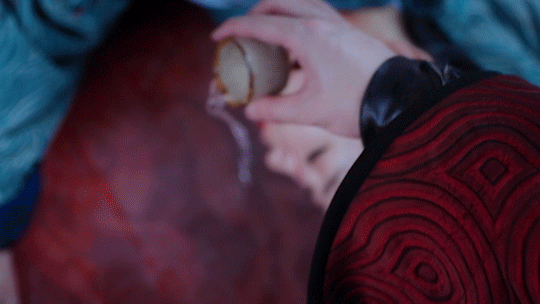
Yu Ziyuan’s actress Zhang Jingtong is able to have liquid poured INTO HER EAR without flinching. Mad props.
The brothers eventually finish running and arrive in a field with an extreme purple photo filter on it. Which I've done my best to remove for these gifs, with variable results.
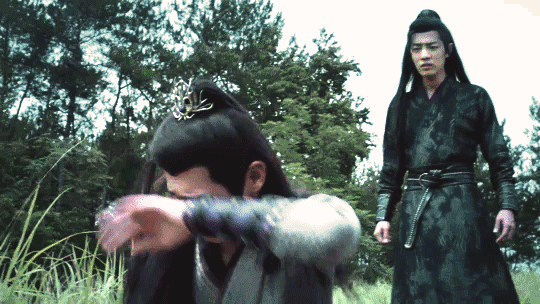
Jiang Cheng wants to turn around and go back to Lotus Pier. He says he wants to retrieve his parents’ bodies and to take revenge, but he's devastated and it seems likely he just wants to die with everyone else.
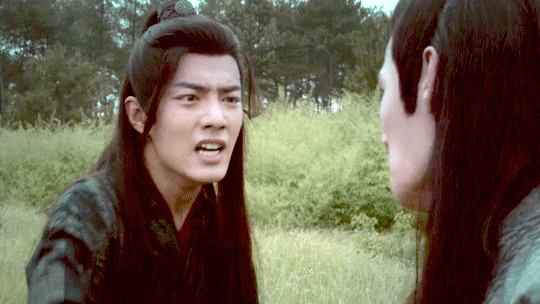
Wei Wuxian pleads with Jiang Cheng to calm down and stay safe, while Jiang Cheng gives himself over to anger and shock as the brothers shout at each other.
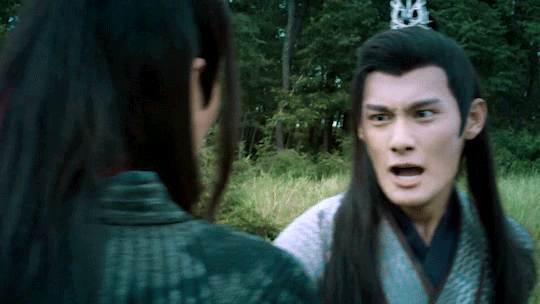
Punching and running ensues, and Wei Wuxian tries to hold his brother back, grabbing him around the shoulders him in a gesture that painfully echoes the many hugs he's given over the years.
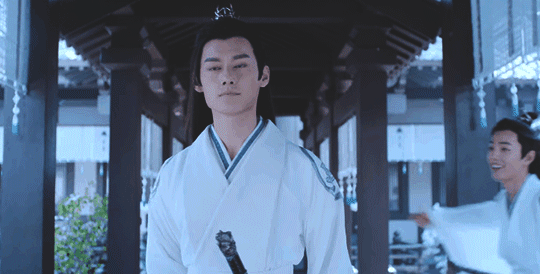
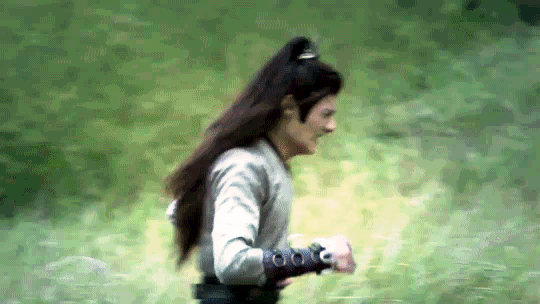
This time Jiang Cheng doesn't just push him off. He turns around and chokes his brother for nearly a full minute, while screaming at him and blaming him.
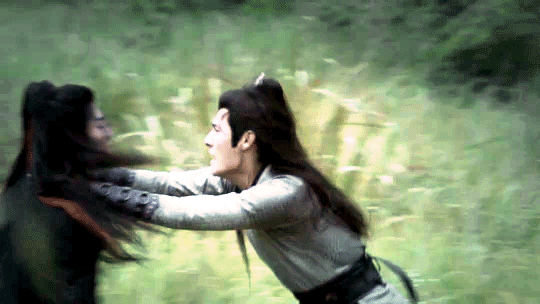
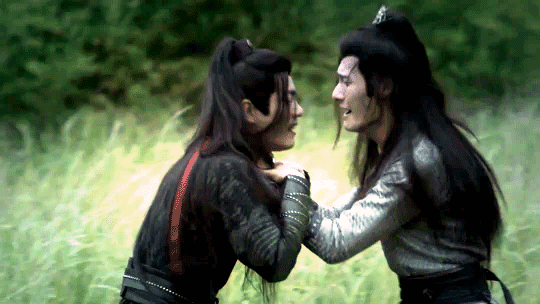
Just as when Madame Yu beat him, Wei Wuxian doesn't fight back; he pulls on Jiang Cheng's wrists but doesn't hit him or try to break his hold.
Finally Jiang Cheng lets him go, and cries out for everyone he's lost, while Wei Wuxian weeps silently next to him. Eventually they fall asleep in the grass together, their bodies curled up in the form of a heart.
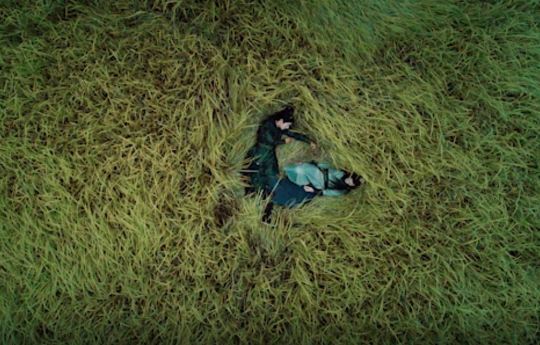
Damn, this episode really brings it.
Side Note: during their argument, Wei Wuxian says, among other things, that "revenge is a dish best served cold," according to subtitles. It's a French saying from the 1800s so it's probably not precisely what Wei Wuxian is saying. More importantly, as a longtime Star Trek fan I can't help but hear James Kirk yelling "KHAN!!!!!" whenever I encounter that phrase.
There’s Got To Be A Morning After
When they wake up in the morning, Jiang Cheng is still in his feelings, but now his feelings have moved along to despair, from anger.
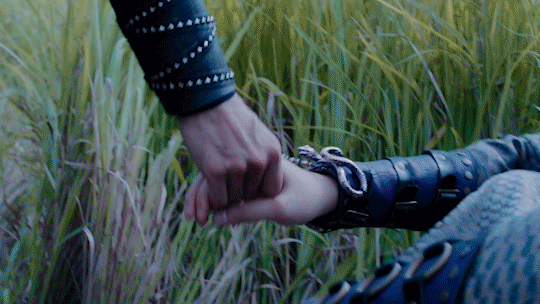
I feel bad for noticing how handsome they both look in this scene. Let's all feel bad about this together.
Jiang Cheng is free to have this level of emotional breakdown because Wei Wuxian is there keeping his own shit together and focusing on what matters.
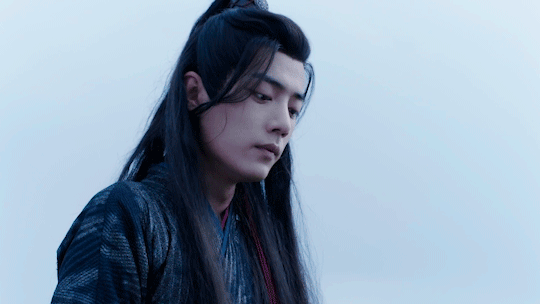
When Jiang Cheng refuses to get up, Wei Wuxian reminds him, very, very gently, that they have a sister, who has waited all night to know what happened.
At this, Jiang Cheng gets up, but won't look at Wei Wuxian, continuing to blame him for everybody else's actions, as he walks onward to find Yanli.
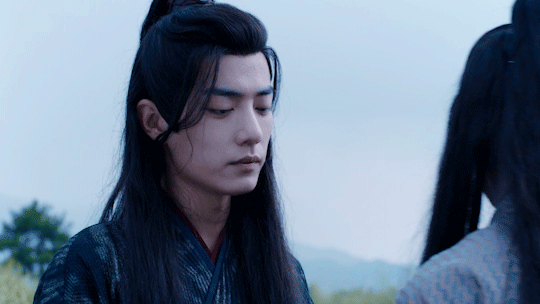
Wei Wuxian follows, hurt and bereft, as he gets to work internalizing everything that he's being accused of. This is good practice for his future as a widely reviled bogeyman.
Part two will be slightly less awful! Coming soon!
#fytheuntamed#the untamed#the untamed gifs#the untamed meta#wei wuxian#jiang cheng#restless rewatch the untamed#canary3d-original#my gifs#yu ziyuan#wen zhuliu#jiang fengmian
341 notes
·
View notes
Text
Jet and Yue’s Deaths: Were They Necessary?
Two of the most common ideas I see for aus in this fandom are the Jet lives au, and the Yue lives au. I’ve written both of these myself, and I’ve seen many others write them. And while yes, fanfiction can be a great way to explore ideas that didn’t necessarily have to be explored in canon (I’m mad at bryke for a lot of things, but not including a Toph and Bumi I friendship is not one of them, even though I wrote a fic about it), it seems to me that people are mad that Yue and Jet are dead, to varying degrees. There’s a lot to talk about regarding their deaths from a sociopolitical perspective (the fact that two of the darker-skinned characters in the show are the ones that died, and all the light-skinned characters lived, is ah... an interesting choice), but I don’t want to look at it that way, at least for right now. I want to look at it as a writer, and discuss whether these deaths were a) necessary for the plot and themes of ATLA in any way whatsoever and b) whether it was necessary for them to unfold in the way that they did, or if they would have been more impactful had they occurred in a different way.
(meta under the cut, this got really, really, really long)
Death in Children’s Media
When I first started thinking about this meta, I had this idea to compare Jet and Yue’s deaths to deaths in an animated children’s show that I found satisfying. And in theory, that was a great idea. Problem is: there aren’t very many permanent deaths in children’s animation, and the ones that do exist aren’t especially well-written. This may be an odd thing to say in what is ostensibly a piece of atla crit, but Yue’s death is probably the best written death in a piece of children’s animation that I can think of. That’s not a compliment. Rather, it’s a condemnation of the way other pieces of children’s animation featuring permanent character death have handled their storylines.
I’ve talked about this before, but my favorite show growing up was Young Justice, and my favorite character on that show was far and away Mr. Wally West. So when he died at the end of season 2, it broke me emotionally. Shortly thereafter, Cartoon Network canceled the show, and I started getting on fan forums to mourn. Everybody on these fan forums was convinced that had Cartoon Network not canceled the show, Wally would have been brought back. And that is a narrative that I internalized for years. Eventually, the show was brought back via DC’s new streaming service, and I tuned in, waiting for Wally to also be brought back, only to discover that that wasn’t in the cards. Wally was dead. Permanently.
So now that I know that, I can talk about why killing him off was fucking stupid. Wally’s death occurs at the end of season 2, after the main s2 conflict, the Reach, has been defeated, save for these pods that they set up all over the world to destroy Earth. Our heroes split up in teams of two to destroy the pods, and they destroy all of them, except for a secret one in Antartica. It can only be neutralized by speedsters, so Wally, Bart, and Barry team up to destroy it. It’s established in canon that Wally is slower than Bart and Barry, and it’s been played for laughs earlier in the season, but for reasons unexplained, the pod is better able to target Wally because he’s slower than Bart and Barry, and it kills him. After the emotional arc of the season has wrapped up, a literal main character dies. There’s some indication at the end of that season that his death is going to cause Artemis to spiral and become a villain, but when season 3 picks up, she’s doing the right thing, with seemingly no qualms about her position in life as a hero. In the comics, something like this happens to Wally, but then he goes into the Speed Force and becomes faster and stronger even than Barry, in which case, yes, this would have advanced the plot, but that’s probably not in the cards either.
In summary, Wally’s death doesn’t work as a story beat, not because it made me mad, but because it doesn’t advance the plot, nor does it develop character. Only including things that advance plot or develop character is one of the golden rules of writing. Like most golden rules of writing, however, it’s not absolute. There is a lot of fun to be had in jokey little one off adventures (in atla, Sokka’s haiku competition) or in fun worldbuilding threads that add depth to your setting but don’t really come up (in atla, the existence of Whaletail Island, which is described in really juicy ways, even though the characters never go there.) But in general, when it comes to things like character death, events should happen to develop the plot or advance character. Avatar, for all of its flaws, is really well structured, and a lot of its story beats advance plot and develop character at the same time. However, the show also bears the burden of being a show directed at children, and thus needing to be appropriate for children. And as we know, Nickelodeon and bryke butted heads over this: the death scene that we see for Jet is a compromise, one that implicitly confirms his death without explicitly showing it. So bryke tasked themselves with creating a show about imperialism and war that would do those themes justice while also being appropriate for American children and palatable to their parents.
The Themes of Avatar vs. Its Audience
So, Avatar is a show about a lone survivor of genocide stopping an imperialist patriarchal society from decimating the rest of the world. It’s also a show about found family and staying true to yourself and doing your best to improve the world. These don’t necessarily conflict with each other, and it is possible for children to understand and enjoy shows about complex themes. And in a lot of cases, bryke doesn’t hold back in showing what the costs of war against an imperialist nation are: losing loved ones, losing yourself, prison, etc. But when it comes to death, the show is incredibly hesitant. None of the main characters that we’ve spent a lot of time getting to know die (not even Iroh, even though he was old and it would have made sense and his VA died before the show was over--but that’s a topic for another day.) This makes sense. I can totally imagine a seven year-old watching Avatar as it was coming out and feeling really sad or scared if a major character died. I was six years older than that when Wally died, and it’s still sad and terrifying to me to this day. However, in a show about war, it would be unrealistic to have no one die. Bryke’s stated reason for killing off Jet is to show the costs of war. I’ve seen a lot of posts about Jet’s death that reiterate some version of this same point--that the great tragedy of his character is that he spent his life fighting the Fire Nation, only to die at the hands of his own country. Similarly, I’ve seen people argue in favor of Yue’s death by saying that it was a great tragedy, but it showed the sacrifices that must be made in a war effort.
Yue
When we first meet Yue, she is a somewhat reserved, kind individual held back by the rigid social structures of the NWT*. She and Sokka have an immediate attraction to one another, but Yue reveals that she is engaged to Hahn. The Fire Nation invasion happens, Zhao kills Tui, and Yue gives up her life to save her people and the world, and to restore balance. Since we didn’t have a lot of time to get to know Yue, this is framed less as Yue’s sacrifice and more as Sokka’s loss. Sokka is the one who cares for Yue, Sokka is the only one of the gaang who really interacts a lot with Yue on screen, and Sokka is the one we’ve spent a whole season getting to know. While I wouldn’t go so far as to call Yue a prop character (i.e. a character who could be replaced by an object with little change to the narrative), she is certainly underdeveloped. She exists to be unambiguously likable and good, so we can root for her and Sokka, and feel Sokka’s pain when she dies. In my opinion, this is probably also why a lot of fic that features Yue depicts her as a Mary Sue--because as she is depicted in the show, she kind of is. We don’t get to see her hidden depths because she is written to die.
In light of what we’ve established earlier in this meta, this makes sense. Killing off a fully-realized character whom the audience has really gotten to know and care about on their own terms, rather than through the eyes of another character, could be really sad and scary for the kids watching, but not killing anyone off would be an unrealistic depiction of war and imperialism. On the face of it, killing off an underdeveloped, unambiguously likable and good character, whom one of our MCs has a deep but short connection with, is the perfect compromise.
But let’s go back to the golden rule for a second. Does Yue’s death a) advance the plot, and/or b) develop character? The answer to the first is yes: Yue’s death prompts Aang to use the Avatar State to fight off the Fire navy, which has implications for his ability to control the Avatar State that form one of the major arcs of book 2. The answer to the second? A little more ambiguous. You would think that Yue’s death would have some lasting impact on Sokka that is explored as part of his character arc in book 2, that he may be more afraid to trust, more scared of losing the people he loves, but outside of a few episodes (really, just one I can think of, “The Swamp”) it doesn’t seem to affect him that much. He even asks about Suki in a way that is clearly romantically motivated in “Avatar Day.” I don’t know about you, but if someone I loved sacrificed herself to become the moon, I don’t think I would be seeking out another romantic entanglement a few weeks after her death. Of course, everybody processes grief differently, and one could argue that Sokka has already lost important people in his life, and thus would be accustomed to moving on from that loss and not letting himself dwell on it. But to that, I’d say that moving on by throwing himself into protecting others has already shown itself to be an unhealthy coping mechanism. Remember, Sokka’s misogyny at the beginning of b1 is in part motivated by the fact that his mother died at the hands of the Fire Nation and his father left shortly thereafter to fight the Fire Nation, and he responds to those things by throwing himself into the role of being the “man” of the village and protecting the people he loves who are still with him. Like with Yue, he doesn’t allow himself to dwell on his mother’s death. This could have been the beginning of a really interesting b2 arc for Sokka, in which he throws himself into being the Avatar’s companion to get away from the grief of losing Yue, but this time, through the events of the show, he’s forced to acknowledge that this is an unhealthy coping mechanism. And maybe this is what bryke was going for with “The Swamp”, but this confines his whole process of grief to one episode, where it could have been a season-long arc that really emphasized the effect Yue’s had on his life.
In the case of Yue, I do lean toward saying that her death was necessary for the story that they wanted to tell (although, I will never turn down a good old-fashioned Yue lives au that really gets into her dynamism as a character, those are awesome.) However, the way they wrote Sokka following Yue’s death reduced her significance. The fact that Yue seemed to have so little impact on Sokka is precisely what makes her death feel unnecessary, even if it isn’t.
Jet
Okay. Here we go.
If you know my blog, you know I love Jet. You know I love Jet lives aus. Perhaps you know that I’m in the process of writing a multichapter Jet fic in which he lives after Lake Laogai. So it’s reasonable to assume that, in a discussion of whether or not Jet’s death was necessary, I’m gonna be mega-biased. And yeah, that’s probably true. But up until recently, I wasn’t really all that mad about Jet dying, at least conceptually. As I said earlier, bryke says that in the case of Jet’s death, they wanted to kill a character off that people knew and would care about, so that they could further show the tragedies of war and imperialism. Okay. That is not, in and of itself, a bad idea.
My issue lies with the execution of said idea. First of all, the framing of Jet’s original episode is so bad. Jet is part of a long line of cartoon villains who resist imperialism and other forms of oppression through violence and are punished for it. This is actually a really common sort of villain for atla/lok, as we see this play out again with Hama, Amon, and the Red Lotus. To paraphrase hbomberguy’s description of this type of villain, basically liberal white creators are saying, “yeah, oppression is bad, but have you tried writing to your Congressman about it?” With Jet, since we have so little information about the village he’s trying to flood, there are a number of different angles that would explain his actions and give them more nuance. My preferred hc is that the citizens of Gaipan are a mix of Earth civilians, Fire citizens, and FN soldiers, and that the Earth citizens refused to feed or house Jet and the other Freedom Fighters because they were orphans and, as we see in the Kyoshi Novels, Earth families stick to their own. Thus, when Jet decides to flood Gaipan, he’s focused on ridding the valley of Fire Nation, but he doesn’t really care about what happens to the Earth citizens of Gaipan because they actively wronged him when he was a kid. That’s just one interpretation, and there have been others: Gaipan was fully Fire Nation, Gaipan was both Earth Kingdom and Fire Nation but Jet decided that the benefits of flooding the valley and getting rid of the Fire Nation outweighed the costs of losing the EK families, etc, etc. There are ways to rewrite that scenario so that Jet is not framed as an unambiguously bloodthirsty monster. In the context of Jet’s death, this initial framing reduces the possible impact that his death could have. Where Yue was unambiguously good, Jet is at the very least morally gray when we see him again in the ferry. And where we are connected to Yue through Sokka, the gaang’s active hatred of Jet hinders our ability to connect with him. This isn’t impossible to overcome--the gaang hates Zuko, and yet to an extent the audience roots for him--but Jet’s lack of screentime and nuanced framing (both of which Zuko gets in all three seasons) makes overcoming his initially flawed framing really difficult.
So how much can it really be said, that by the time we get to Jet’s death, he’s a character that we know and care about? So much about him is still unknown (what happened to the Freedom Fighters? what prompted Jet’s offscreen redemption? who knows, fam, who knows.) Moreover, most of what we see of him in Ba Sing Se is him actively opposing Zuko and Iroh. These are both characters that at the very least the show wants us to care about. At this point, we know almost everything there is to know about them, we’ve been following them and to an extent rooting for them for two seasons, and who have had nuanced and often sympathetic framing a number of times. So much of the argument I’ve seen regarding Jet centers around the fact that he was right to expose Zuko and Iroh as Firebenders, but the reason we have to have that argument in the first place is because it’s not framed in Jet’s favor. In terms of who the audience cares about more, who the audience has more of an emotional attachment towards, Zuko and Iroh win every time. Whether Jet’s actually in the right or not is irrelevant, because emotionally speaking, we’re primed to root for Zuko and Iroh. In terms of who the framing is biased towards, Jet may as well be Zhao. So when he’s taken by the Dai Li and brainwashed, the audience isn’t necessarily going to see this as a bad thing, because it means Zuko and Iroh are safe.
The only real bit of sympathetic framing Jet gets are those initial moments on the ferry, and the moments after he and the gaang meet again. So about five, ten minutes of the show, total. And then, he sacrifices himself for the gaang. And just like Yue, his death has little to no impact on the characters in the episodes following. Katara is shown crying for four frames immediately following his death, and they bring him up once in “The Southern Raiders” to call him a monster, and once in “The Ember Island Players”, a joke episode in which his death is a joke.
So, let’s ask again. Does this a) advance the plot, and/or b) develop character? The answer to both is no. It shows that the Dai Li is super evil and cruel, which we already knew and which basically becomes irrelevant in book 3, and that is really the only plot-significant thing I can think of. As far as character, well, it could have been a really interesting moment in Katara’s development in forgiving someone who hurt her in the past, which could have foreshadowed her forgiving Zuko in b3, but considering she calls Jet a monster in TSR, that doesn’t track. There could have been something with Sokka realizing that his snap judgment of Jet in b1 was wrong, but considering that he brings up Jet to criticize Katara in TSR, that also does not track. And honestly, neither of these possible character arcs require Jet to die. What requires Jet to die is the ~themes~.
Let’s look at this theme again, shall we? The cost of war. We already covered it with Yue, but it’s clearly something that bryke wants to return to and shed new light on. The obvious angle they’re going for is that sometimes, you don’t know who your real enemy is. Jet thought that his enemy was the Fire Nation, but in the end, he was taken down by his own countryman. Wow. So deep. Except, while it’s clear that Jet was always fighting against the Fire Nation, I never got the sense that Jet was fighting for the Earth Kingdom. After all, isn’t the whole bad thing about him in the beginning is that he wants to kill civilians, some of whom we assume to be Earth Kingdom? Why would it matter then that he got killed by an EK leader, when he didn’t seem to ever be too hot on those dudes? But okay, maybe the angle is not that he was killed by someone from the Earth Kingdom, but that he wasn’t killed by someone from the Fire Nation. Okay, but we’ve already seen him be diametrically opposed to the only living Air Nomad and people from the Water Tribes. Jet fighting with and losing to people who aren’t Fire Nation is not a new and exciting development for him. Jet has been enemies with non-FN characters for most of the show’s run at this point. There is no thematic level on which the execution of this holds any water.
The reason I got to thinking about this, really analyzing what Jet’s death means (and doesn’t mean) for the show, was this conversation I was having with @the-hot-zone in discord dms. We were talking about book 2 and ways it could have been better, and Zone said that they thought that Jet would have been a stronger character to parallel with Zuko’s redemption than Iroh and that seeing more of the narrative from Jet’s perspective could have strengthened the show’s themes. And when it came to the question of Jet’s death, they said, “And if we are going with Jet dying, then I want it to hurt. I want it to hurt just as much as if a main character like Sokka had died. I want the viewer to see Jet's struggles, his triumphs, the facets of Jet that make him compelling and important to the show.” And all of that just hit me. Because we don’t get that, do we? Jet’s death barely leaves a mark. Jet himself barely leaves a mark. His death isn’t plot-significant, doesn’t inspire character growth in any of our MCs, and doesn’t even accomplish the thematic relevance that it claims to. So what was the point?
Conclusion
Much as I dislike it, Yue’s death actually added something to atla. It could have added much, much more, in the hands of writers who gave more of a shit about their Brown female characters and were less intent on seeing them suffer and knocking them down a peg, but, in my opinion, it did work for what it was trying to do. Jet? Jet? Nah, fam. Jet never got the chance to really develop into a likable character because he was always put at odds with characters we already liked, and the framing skewed their way, not his. The dude never really had a chance.
*multiple people have spoken about how the NWT as depicted in atla is not reminiscent of real life Inuit and Yupik people and culture. I am not the person to go into detail about this, but I encourage you to check out Native-run blogs for more info!
130 notes
·
View notes
Text
The Thief and the Tinker, Part 3: I See Fire
part 2
Part 3
Viren: Well how do you suggest we get him out?
Claudia: *grins, brandishes marshmallow on toasting fork* Unharmed is just another kind of harmed
Viren: Claudia no
Claudia: Claudia YES
I See Fire
Angst rating: 9/10
Viren is clever enough not to take the Silvergrove on alone, no matter how badly he wants Ethari to make him a magic key. Aaravos could be cooking in that pod for a while longer, but Viren still has a trustworthy and badass ally at his side.
Oh yeah, it's Claudia Time again!
Claudia is a powerful and imaginative dark mage, and she has the tainted Sun staff. So, you're the magefam, and you've made it to Xadia, to the edges of the Moonshadow Forest. And all you need to do to get the power of your dreams is to threaten one soft craftsman. But how do you find one specific Moonshadow elf in a hidden Moonshadow village somewhere in the middle of a giant spooky magical forest?
You burn him out.
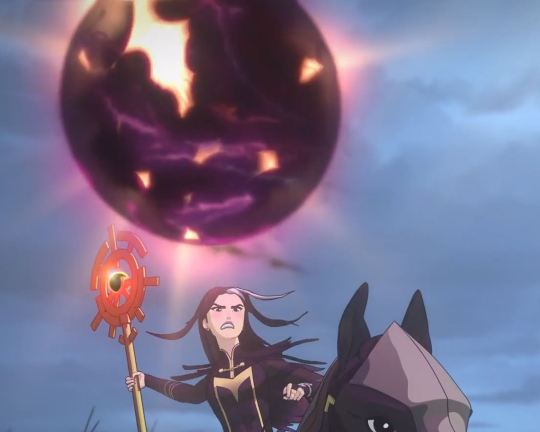
Credit once again to@random-fandom-ramble for reminding me of this forest fire headcanon, because it fits so well. and so I don't get all the blame for this one, lol
Because see, that's not ordinary fire. Oh, no. That's dark magic fire. We've seen that before. It leaves permanent scars. Remember Sol Regem's eyes?

That's going to be the landscape when Claudia's fire gets through with the Moonshadow elves' home. Where I live on the US West Coast, they name forest fires, and if they combine, they get called complexes. So maybe we can name this fire the Dark Tragedy Complex? Because I do have to wonder... you could start a dark magic forest fire easily with a tainted Sun staff, but how do you put it out?
Two things are going to happen if these events should unfold. One is angsty. The other is also angsty but then amazing.
Firstly, Viren is going to get what he wants. He'll find Ethari, whose tree burned down :(. He'll show him the coins, and he'll offer a trade. Build what he wants and make it work, and Ethari can have his family back, uncoined and free.
And Ethari will say yes.
He'll say yes no matter what anyone else tries to persuade him to do, and I hope they do try, because see: Ethari has to make it look good. He has to make it look like he's all in on Viren's plan, to Viren. Even if that means turning his back on his people in their time of greatest need.
Secondly, the Moonshadow elves are going to be collectively homeless and bereft, hungry, injured, terrified, angry. They will have nowhere to go. They will be a people without a home. And no one else in Xadia will help them. Maybe they're too terrified to hide Ethari's people in case doing so brings Viren down on them, too. We've seen how ordinary elves flee in terror from dark magic. Maybe they're all fighting other issues, too. Viren knows all about stretching resources too far during times of crisis. Whatever the case, there will be no welcome anywhere in Xadia for the Moonshadow elves of the Moonshadow Forest.
But here's where it gets amazing. Because one hand will reach out. One small hand, from across the border. Good King Ezran will stand up on the seat of his throne and say, "You can stay here. I have forests. You're tired, you're hungry. You need medicine. Let me help."
And I'm gonna cry like a little baby.
How many cycles does this break, how many circles does it complete? Moonshadow elves used to live in Katolis before the border was created. When humans were under threat of total annihilation, the Moonshadow leader's daughter spoke up and asked for mercy. That mercy came in the form of land reassignment, and the Moonshadow elves had to give up their ancestral home, their Nexus, and travel east across the new Border. But that mercy got paired with justice, and the life-loving Moon Druids probably had to swear some kind of blood promise to keep an eye on the humans forevermore, and to kill any individuals who got out of hand, as if their sins were the Moonshadows' responsibility now.
That's got to breed a little resentment, a little superiority. "Look what we sacrificed for you, and this is how you act. Ungrateful." And maybe that was partially Luna Tenebris's goal: to hold to her vision of justice, she had to make the elves who shared her arcanum feel a little resentment. Moonshadows love life, but we can't have them being too soft to keep Xadia safe from dark mages, now, can we? I will never stop cackling over dragon politics okay, never
But the Moonshadow elves never figured on King Ezran. A soft boy who refused to let his father's assassination harden his heart, because every life is genuinely important to him. I've seen headcanons for Ezran getting the Sun, Earth, Ocean, and Stars arcanum. How about Moon, too? Because this is very Ethari of him, and if these stories of Viren's plan and the Moonshadow elves' displacement were actually to happen in tandem, the contrast between Ezran's soft choice and Ethari's hard one would be mindblowing.
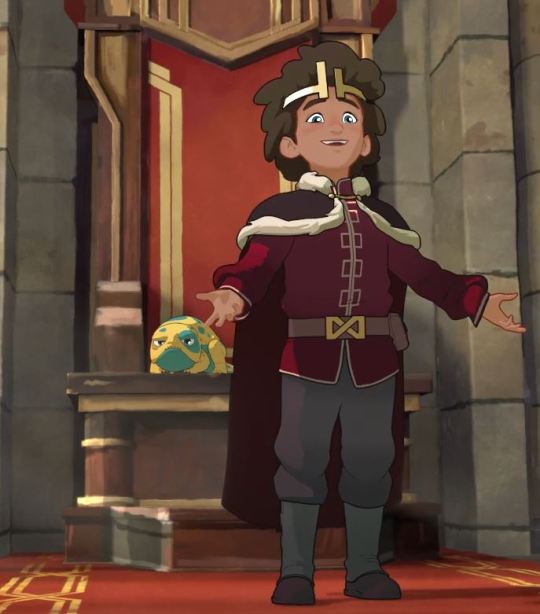
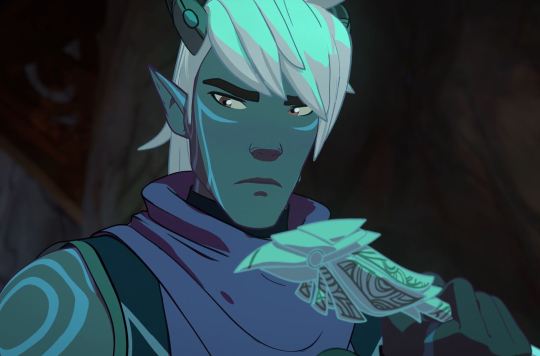
Ezran completes the circle by inviting the Moonshadow elves to return to Katolis, to their ancestral home. They left long ago, paying the price for an act of mercy, but they were welcomed back by the mercy of humans, repaid after a thousand years, repaid in the face of tragedy. Tragedy on all sides. Tragedy Ezran wants to stop from happening, by being brave and caring and soft, and by being the first to break this thousand-year cycle between Katolis and the Moonshadow elves.
Rayla is his friend. And these are her people. It won't matter what they've done, only that they need help in a time of great desperation. And of course he'll help them. He's Ezran, and he's Katolis's greatest treasure.
Oh, what's that you say? Inviting the Moonshadow elves to settle in Katolis again would make it easier for Rayla to live with Callum in the future? Oh gosh, how about that? What a deal. *smug matchmaker noises*
And once the Moonshadow elves understand that they're safe and begin to trust Ezran--which could happen very quickly, because saving a Moonshadow elf's life when you didn't need to is a really fast way to prove you're trustworthy--maybe Ezran will be encouraged to take the next step toward peace, and eventually other elves and dragons will come to meet together to talk it over. And Ez will offer them jelly tarts, which they will love.
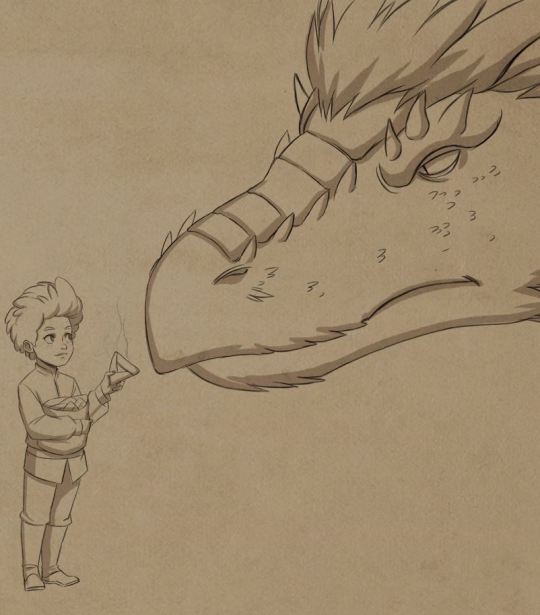
Back to Ethari, because we're not done with him yet. Ethari is soft, but he isn't weak. He won't be a willing pawn for Viren. He loves Runaan to the point of invention, and his devotion is more constant than the moon itself. He'll agree to do what Viren says, and he'll be Very Sad. But his spirit is in no way broken. Viren bribing him with the coins containing his family will only have the opposite effect. It'll give Ethari something to fight for.
We could get Focused Chaos Ethari. We could get Angery Trickster Ethari. We could get Rules, What Rules? Ethari. Let him try to steal the coins, try to break them, try to kill Viren, and be stymied at every turn, until he settles and seems cowed. And then all he does is craft his way out of the problem. What if we are gifted with Iron Man Ethari, who pretends to build a fake Key for Viren, but meanwhile he's really building a coinbuster with whatever he can get his hands on - primal stones, magically imbued gemstones, stolen artifacts, his own arcanum, his own reputation as the Master Craftsman of the Silvergrove. He'll use almost- almost - anything, to stop Viren and free his family.
Ethari may have to choose between those two things, though. And he's a hero, deep down, just like his family, just like his daughter. If he has to choose, he'll choose to stop Viren and save Xadia. He'll pay the same price as his family has if he must.
He'd let Viren think he was motivated purely by wanting his family back, but Ethari is far too steeped in the illusion and sacrifice for that to be all there is to his motives. It's a so-close-and-yet-so-far thing, how he and Viren almost embody the same ideals. Almost. Ethari would take one look at Viren, who just burnt down his whole Forest, he'd see the biggest threat in Xadia, and he'd say anything to get a chance to stop this juggernaut of destruction from getting his hands on whatever that ultimate power really is, locked behind that missing key. If he has to abandon his people and bawl his eyes out to convince Viren he's in, then he will.
And Viren wouldn't make it easy for him. He knows clever when he sees it. He went through all this trouble to persuade Ethari to work with him. He would need to keep Ethari as off-balance as possible to ensure that he keeps working as he should.
Angsty jewelry, anyone: Viren giving Ethari his husband in pendant form to remind him what he's working for, when Viren and Ethari both know full well that only dark magic can open the hellcoins. Ethari wearing another pendant of his love, except it's not a metaphor this time. It's literally his love, in a coin around his neck.
Viren would know that Ethari would have to stay close to Viren of his own free will if he ever hoped to free Runaan. And making people bind themselves to you is a big power flex. Remember that TDP stream future-season teaser note about Bait being in a creepy restraint in a future season?

This card is written on in all-caps, so that really could be "Bait" or "bait," or--knowing this show--both. Viren's been using Runaan as bait for Ethari all along. Putting his coin in a dark magic pendant casing for Ethari to wear would be a great parallel for that. Oh god. Oh man.
Maybe he'll stab the coin's scary casing right through that circle on Ethari's chest, right over his heart, make that Iron Man reference really obvious. Ethari also losing his shirt at some point, for angsty Viren-related reasons? It's more likely than you think. I mean... Ethari is literally involved in both forms of forging at this point. Shirt's gotta come off for uhhhh work reasons. And because he's hot. Because of all the forging. I mean how else are we finally going to discover what his markings look like
I mentioned that I liked god-tier villains, right? Yeah, this is amazing. I haven't wanted to die and ascend over an idea for quite a while, but Ethari vs Viren in a drawn-out battle of wills would kill me in the best way. Especially since, while it looks like they're essentially fighting for who gets Runaan, they're truly fighting a much larger battle with much higher stakes. They're fighting for the future itself. It's an epic struggle between the Narrative of Strength and the Narrative of Love. And we've seen what happens, over and over, when the Narrative of Strength gets to call the shots.
On a meta note: If Runaan and Ethari's story arc isn't a love letter from one trauma survivor to another, and on a broader scope to all survivors who see it, I don't know what is. Sometimes life just chews us up and spits us out and we can't stop it and it breaks us. But sometimes we can reach out and grasp the chance to help each other, even after that, even when it hurts a lot, because we know what it means to be loved, and to love, and to want a safer future for each other and for people we'll never meet. The future is worth standing together for, helping each other back up for, fighting side by side for, even if you can't see how it'll end, or even how to begin. We are stronger together, and sometimes we need to fight for our "together" before we can fight for anything else. And that's worth it, every time.
This is glorious, it's beautiful, it's tragic, it's amazing, it makes me want to dance, it makes me want to scream into the void, it makes me want to slap someone with a semi truck. No, someone specific, don't worry, and he super deserves it.
Because Ethari is going to win. He was always going to win. He's soft, and he's clever, and he hasn't forgotten what love means. It's what he's fighting for. Not power, not control. Love. He doesn't want to dictate Runaan's future, or anyone else's. He just wants his husband--and everyone else--to have one at all.
So he's going to win.
What beating Viren looks like, I can't guess yet. TDP is no stranger to angst, so there will probably be a high cost involved in thwarting the dark mage. Maybe not everyone can be rescued from the coins. Maybe Ethari will lose his life, or his soul, or his vision, or something else really angsty. Viren could even kill him and resurrect him as a smoky craftsman, or a zombie craftsman, or something equally biddable but horrible. The only thing I'm sure of is that Ethari would never willingly make a working Key of Aaravos Ethari as long as there's a chance Viren could possess it. But I do believe that if he gets the right opportunity while he's busy saving the world from Viren's dark intentions, he'll break his husband's hellcoin open somehow and set him free, even if he has to smile at the devil to do it.
part 4
#tdp#tdp theory#tdp speculation#tdp parallels#viren#ethari#laindrin#runaan#moonshadow elves#moonshadow assassins#hopepunk#tdp angst#heavy angst#tw trauma
15 notes
·
View notes